"Murder on the Orient Express" Production Information |
Read more at in70mm.com The 70mm Newsletter |
| Written by: 20th Century Fox. Unless noted, all pictures and posters: 20th Century Fox. | Date:
20.10.2017 Updated 22-01-25 |
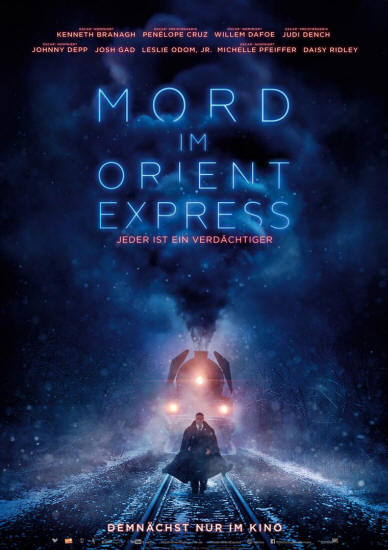 TWENTIETH
CENTURY FOX PRESENTS TWENTIETH
CENTURY FOX PRESENTSDIRECTED BY KENNETH BRANAGH SCREENPLAY BY MICHAEL GREEN BASED ON THE NOVEL BY AGATHA CHRISTIE STARRING TOM BATEMAN, LUCY BOYNTON, KENNETH BRANAGH, OLIVIA COLMAN, PENÉLOPE CRUZ, WILLEM DAFOE, JOHNNY DEPP, JUDI DENCH, JOSH GAD, MANUEL GARCIA-RULFO, DEREK JACOBI, MARWAN KENZARI, LESLIE ODOM JR., MICHELLE PFEIFFER, SERGEI POLUNIN, DAISY RIDLEY PRODUCERS RIDLEY SCOTT, p.g.a., MARK GORDON, p.g.a., SIMON KINBERG, p.g.a., KENNETH BRANAGH, p.g.a., JUDY HOFFLUND, p.g.a., MICHAEL SCHAEFER, p.g.a. EXECUTIVE PRODUCERS ADITYA SOOD, MATTHEW JENKINS, JAMES PRICHARD, HILARY STRONG DIRECTOR OF PHOTOGRAPHY HARIS ZAMBARLOUKOS BSC, GSC PRODUCTION DESIGNER JIM CLAY FILM EDITOR MICK AUDSLEY COSTUME DESIGNER ALEXANDRA BYRNE HAIR & MAKE-UP DESIGNER CAROL HEMMING |
More in 70mm reading: Where to see "Murder on the Orient Express" in the splendour of 7OMM PDF: Murder on the Orient Express - Production Notes Final PDF: Murder on the Orient Express - Info sheet PDF: Marklin H0 model_39241 “Murder on the Orient Express”: The North American 70mm Engagements "Venice Simplon-Orient-Express" in Copenhagen Central Station, Denmark Kodak is making investments in introducing 65mm film processing in Europe Chronological premiere list of all real 70mm films Now showing in 70mm in a theatre near you! Internet link: • "Murder on the Orient Express" UK • Clues are everywhere • Venice Simplon Orient Express • "Murder in the Orient Express" in Triengen, Switzerland. 2017.03.17 Variety THR |
INTRODUCTION |
|
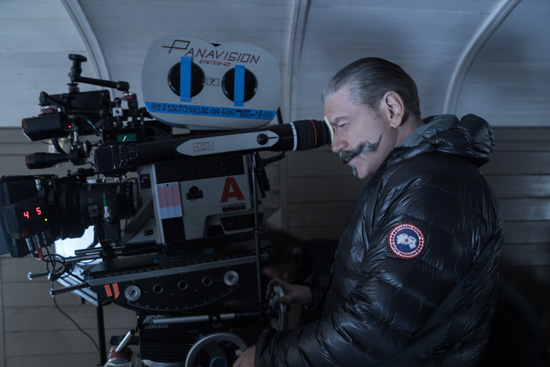 In
the most timeless of whodunits, MURDER ON THE ORIENT EXPRESS follows
renowned detective Hercule Poirot (KENNETH BRANAGH) as he attempts to solve
what would become one of the most infamous crimes in history. In
the most timeless of whodunits, MURDER ON THE ORIENT EXPRESS follows
renowned detective Hercule Poirot (KENNETH BRANAGH) as he attempts to solve
what would become one of the most infamous crimes in history. After a shocking murder of a wealthy businessman on the lavish European train barreling its way west in the dead of winter, private detective Poirot must use every tool of his trade to uncover which of the train’s eclectic passengers is the killer, before he or she strikes again. Published in 1934, Agatha Christie’s novel, Murder on the Orient Express is considered one of the most ingenious stories ever devised. More than 80 years after its publishing, Christie’s novel remains beloved by new generations of readers. Kenneth Branagh’s stunning retelling of the beloved mystery with its acclaimed ensemble and breathtaking visuals invites audiences to take the most suspenseful train ride of their lives. |
Murder on the Orient Express "We wanted to bring the FULL experience to the audience, so I shot on (70mm) film. It essentially means, it looks sharper, richer, more colorful and feels like you are inside it." Kenneth Branagh: foxmovies.com Lokomotiv SNCF 241-A-65 + WiKipedia. H0 1:87 scale model 39241 announced by Märklin "Murder On The Orient Express" Behind-The-Scenes - Production Featurette "Murder on the Orient Express" audio book |
ABOUT THE PRODUCTION |
|
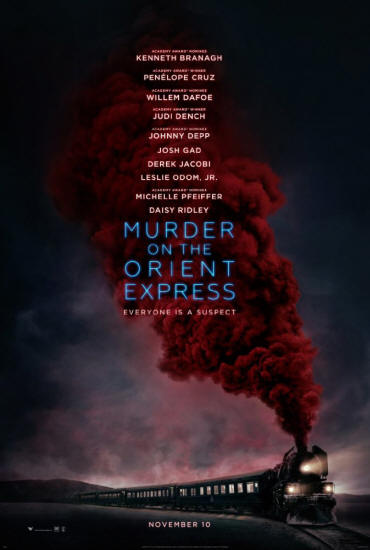 EVERYONE IS A SUSPECT EVERYONE IS A SUSPECTAgatha Christie’s classic mystery, with its richly drawn characters confined to a luxurious passenger train, taut scenes and crisp dialogue, has fixated audiences since the novel’s debut in 1934. The Times of London wrote upon its publishing, “The little grey cells solve once more the seemingly insoluble. Mrs. Christie makes an improbable tale very real, and keeps her readers enthralled and guessing to the end." Readers have been captivated with the mystery, the crime, the story, and the character of Hercule Poirot for generations. The allure of the Orient Express was magnified by Christie’s work, and travelers continue to flock to discover the illustrious compartments and service to this day. Room 411 in the Pera Palace Hotel in Istanbul, where Christie allegedly wrote the novel, also remains a popular destination site. There are societies and clubs the world over dedicated to rediscovering Christie’s mysteries, particularly those featuring Hercule Poirot. Why the endless fascination? "Agatha Christie is expert at bringing depth (with economy) to the observation of characters, making them distinct and colorful, but also believable. I think she enjoys the literary dazzle of that, but in the Orient Express, you also have glamour. You have snow. You have elegance and the golden age of romance in travel. And, of course, you have a murder,” says Kenneth Branagh. This film introduces another generation of moviegoers to an enthralling new interpretation of one of the most beloved mysteries of all time. A “who’s who” of celebrated actors and an acclaimed production team up for the journey. With everything Agatha Christie, it all starts with the story. But to make a film, of course, you then need to get the rights to that story – and for producers Mark Gordon and Simon Kinberg, that proved to be a near-five-year-long journey. Initially, both men had enquired about the rights separately but soon decided that teaming up would be the best approach. Gordon and Kinberg subsequently partnered with Ridley Scott. Now it was time to commission a script… As a huge admirer of Agatha Christie and long-time collaborator with producer Ridley Scott, screenwriter Michael Green (LOGAN, BLADE RUNNER: 2049) was thrilled when he was asked to bring this fabulous story to the screen. Producer Scott, a Christie fan himself, and an admirer of Sidney Lumet’s 1974 version of Murder on the Orient Express, had leapt at the chance to re-explore the book, seeing it a wonderful opportunity to present the author’s work to a modern-day audience. Green agrees. “They're incredible stories with characters that you want to see more and more of,” says Green. “And if you're lucky enough to catch an Agatha Christie book or play at the right age, it's going to stay with you and remain charming in your memory." But even as a Christie fan, one story stands out for Green: "I'm very fortunate that my favorite Agatha Christie is, hands down, Murder on the Orient Express. It not only features Poirot, my favorite character of hers, but it's a story that has a surprising ending, along with the fascinating people you meet along the way. The setting is grand and everything about it makes it stand apart in my memory as the special one." Green met with the Christie estate to discuss the project: "We all had the same goal: we wanted to bring it into the modern world without changing what's essential to it, without altering its soul, so that a contemporary audience can experience it, believe it and be thrilled by it." For Green, his interpretation of the classic murder mystery came together when Kenneth Branagh (HENRY V, CINDERELLA) came on board: "Probably the most exciting day in the development process was finding out that Ken was interested in directing and starring in it,” says Green. “I have immense respect and appreciation for him, both as an actor and a director. Suddenly, this hypothetical script I had written became a film - one I could now imagine through Ken’s lens and the caliber of the people he would attract to the project.” Great-grandson of Agatha Christie and Chairman of Agatha Christie Ltd, James Prichard, agrees with Green: "I have watched Ken's films since I was very young - I watched his Henry V as part of my university degree, and to have him on this film, an incredibly talented director and one of the best actors of his generation, to have someone of that quality want to play Poirot gives me an enormous sense of pride." Known for his love of classics, Kenneth Branagh was a perfect fit from the start. "Fox knew that I loved thrillers, and so they came to me with this most classic of thriller mysteries,” recalls the actor/director. “I think maybe they even knew I liked trains - I certainly liked this title, 'Murder on the Orient Express'. It's always had a special sort of ring to it and it takes you to the golden age of travel. It's also a character piece set in a very confined space, under tremendous tension. There are very interesting disparate characters interacting about the most profound and dangerous of subjects and themes. I read the script by Michael Green, and I was really taken by it." With no shortage of interpretations of Christie’s work, Branagh’s desire to revisit these characters started with the depth and compassion Green mined, as well as the exploration of the darker idea of the motivation for revenge. "Michael Green clearly loved the material, and he loved the characters. He wasn't trying to get easy laughs, and he wasn't poking fun at the characters - particularly Hercule Poirot,” said Branagh. “There was a compassion in the screenplay, and one of the things that surprised and thrilled me about the film is that it's much more an emotional experience than people might imagine. This goes deeper because, it explores grief, and loss, and revenge, with sophistication and soul.” Then there is the setting. For modern audiences, travel has become a hassle, a means to an end destination. The setting of Orient Express harkens back to the care and precision given to travel, and the true luxury of the experience. Green’s script captured the allure of the time and the meticulous details of the famous train. "Michael relishes in the golden age of travel and the attention to detail in the Orient Express, the train, as well as other people's appreciation of it,” says Branagh. “We both experienced that sort of childlike sense of excitement about being able to cross Europe in this wheeled palace, with its confined spaces that also make you think certain things could go bump in the night. So, his feeling for the piece, both for the emotional depths and colors in it, the sense of fun and excitement, where it exists, and the respect for the material, along with certainly the desire to entertain - all of that came winging off the page. His screenplay felt very rich to me." Not only was Branagh excited at the prospect of working with Green’s script, he was also very keen to collaborate with the Agatha Christie Estate: "Mathew Prichard [Christie's grandson] and James Prichard [Christie's great-grandson] were two of the first people I met when I came on board for the project, and this very particular connection was very important to me. Mathew grew up with Agatha Christie, and James is not only a family member, but a very smart, creative influence in the way that estate is run, and a very good collaborator. We all feel that Agatha Christie work is in a very potent moment of evolution. She has already made this massive contribution to the world's entertainment yet she is being rediscovered as someone who has touched on areas of human experience that have relevance for today. She continues to entertain, and make us think in a different way." On the relevance of the story, James Prichard explains: "To me, Murder on the Orient Express is one of the cleverest stories that Agatha Christie wrote. There is an astonishing exploration of justice, and justice was very important to my great-grandmother, and there are elements to this story that I think are unique, and that go to the core of what makes this story so powerful. The back-story is incredibly moving and challenging, and the way Poirot deals with the whole episode is extraordinary." 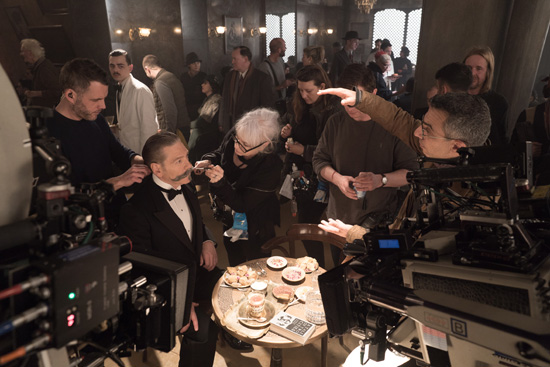 Mathew
Prichard, adds: "It's a mixture of all sorts of things. The glamour, the
originality of the story and the outrageousness of the solution. It was a
brilliantly written book in the 1930’s and I think it's hard to remember
nowadays, how original it must have seemed then. My grandmother traveled in
that direction, and she stopped off in Istanbul on her way to Syria and
Iraq, so for Christie lovers, it has a sense of genuine authenticity of
where she used to go herself." Mathew
Prichard, adds: "It's a mixture of all sorts of things. The glamour, the
originality of the story and the outrageousness of the solution. It was a
brilliantly written book in the 1930’s and I think it's hard to remember
nowadays, how original it must have seemed then. My grandmother traveled in
that direction, and she stopped off in Istanbul on her way to Syria and
Iraq, so for Christie lovers, it has a sense of genuine authenticity of
where she used to go herself."For Green, it was the first time in his career where he would develop a script with someone who is both the director and the lead actor. "Together, we would be thinking not only of how it would be shot, but how he would want to play individual moments. We could look at a line and discuss the tone and the camera angles, but also, I could hear him read it directly to me and I would be able to shape the lines instantly for him. It was a very interesting and efficient process and takes out a lot of the guesswork when the director is the one who knows precisely how the lead actor is going to be speaking the words." Branagh explains why it was a natural fit for him to direct and play Poirot: "It felt that there was a way in which those two things were very congruent with one person doing the same job. Because, crucially, I think, Hercule Poirot is a director. He directs the characters, and like a director, Poirot intuitively tries to listen to the way in which he can be specific and bespoke about how to create the mood that's required for each interrogation.” As a director, the concentration that Branagh would have on all of these amazing actors, and the detail of performance was exactly what Poirot had to have, as he looked for the tell-tale signs of the culprit, which, as Christie points out, is often “Poirot observing just the flicker in an eye.” “Poirot’s a master of observing body language,” said Branagh. “It’s not someone with an object. It's what somebody does with an object. It's the way they eat, or what they leave, or what they don't say, or what constitutes humor. And from his own alleged separate perspective, he often uses this notion that because he's a Belgian, he's separate, and he plays up to a sense that other people have of him as being different, some might say, eccentric, because when they're saying that, they're underestimating him." Oscar-nominated actor Johnny Depp was intrigued by how the story felt relevant and fresh. “It’s got everything you might expect from Agatha Christie,” said Depp. “Death, murder, interesting characters, an unusual, often glamorous situation - all of those elements, inside a wonderful location and journey, are all there. But I was really impressed to return to it and see how it hadn't dated, and, in fact, it had reinvented itself, I think, which is a sign of very good storytelling." Oscar-nominated actor Willem Dafoe was drawn to the script for its character-driven narrative: "For this story, it's the tone that's so important, and the role of Poirot is interesting and beautifully written, as are the balance of the characters. It has a nice edge and it's fun, but it also has a moral dilemma at its center." "All of the major plot points are there,” says Leslie Odom, Jr., “but it's really told for a modern audience who has seen everything and heard everything. How do you excite these kids? How do you make them lean forward in their seats when they've seen so much? I think Ken and Michael have done a really great job with that aspect of the script." The style, grace and romance of Green’s script and the writer’s ability to stay faithful to the essence of the story, while updating it for a modern audience, enticed the acclaimed cast. Explains Manuel Garcia-Rulfo: "It has the same DNA as the novel, but it's more dynamic." Lucy Boynton concurs: "It was a perfect balance between a modern version of it, whilst also staying true to all that is sacred in Agatha Christie's story. That was a really exciting element, to see the way that it had been developed." When Josh Gad first read the script, he immediately knew he wanted to be involved in the project. He explains: "I got about twenty pages into the script and called my agent and I said, 'I don't care if I have to play an usher who's taking tickets, I need to be a part of this film, it's extraordinary.' To me, something this smart, something this epic, something that almost harks back to the golden age of Hollywood cinema, as an actor but also as a cinephile, was really exciting." 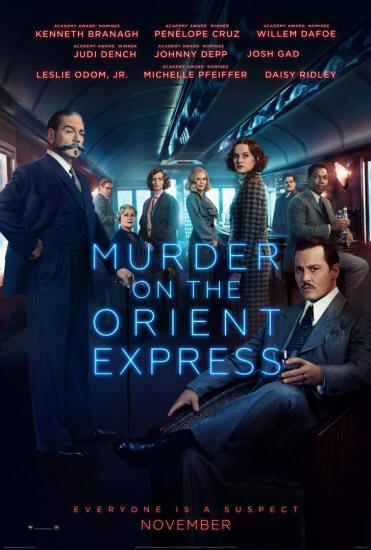 The other big draw was the opportunity to work with the esteemed Branagh.
“What's so great about Ken is he comes to it with the perspective of being
one of us,” said Gad. “He's an actor, first and foremost, and so he
understands the questions we ask ourselves, the insecurities we may have,
and he is able to speak to those questions with the authority of somebody
who has been in our shoes." The other big draw was the opportunity to work with the esteemed Branagh.
“What's so great about Ken is he comes to it with the perspective of being
one of us,” said Gad. “He's an actor, first and foremost, and so he
understands the questions we ask ourselves, the insecurities we may have,
and he is able to speak to those questions with the authority of somebody
who has been in our shoes."Dafoe sees many similarities between Branagh's work as a director and his role as Poirot. He explains: "The role of the director is paralleled by the role that Ken is playing in the story, because as the director he's the circus master who sets the scene and tells everybody what they need to know going forward in the story. A similar thing happens in the story itself, as Poirot really takes hold of the situation and directs the events." A longtime collaborator with Branagh, Derek Jacobi, thinks what makes Ken a very good director is that he's an actor first. “The number of balls he keeps in the air is just mind blowing, but I've always admired his ability to perform and then cut himself off and look at himself objectively... I find that extraordinary, says Jacobi.” “It's quite amazing to see what he does because his eye and his mind are everywhere at once." Oscar-winning actress Penélope Cruz was also impressed with Branagh’s ability to seamlessly move between directing and playing Poirot. "What he's doing with the performances and the camera is really powerful and I feel like he's making a film that will get into our brains in a way that is going to trap us, like some strange magic,” said Cruz.” "It's like this amazing dance that seems so easy for him, which is very rare and all of us are shocked and blown away by how he can be so present. We are such a big cast and he has so much responsibility." Adds Tom Bateman: "Branagh is an incredible company leader, he's a wonderful director, but as an actor, it feels to me is where his energy is and his blood is. He wants to be there and you can feel it when you're acting in a scene with him. He gets so excited to be there which is very comforting, and you almost don't see him directing because he does it so effortlessly." |
|
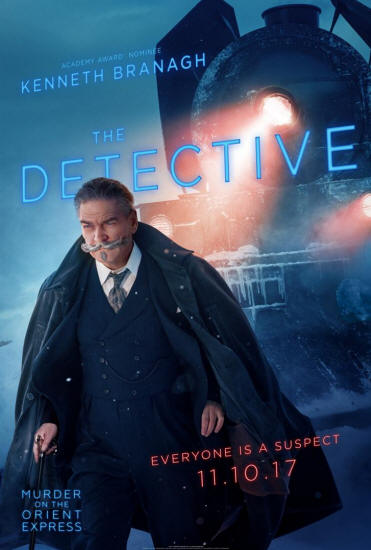 THE
DETECTIVE (Hercule Poirot – Kenneth Branagh) THE
DETECTIVE (Hercule Poirot – Kenneth Branagh)The beloved fictional detective, Hercule Poirot, is one of Agatha Christie’s most famous characters, appearing in 33 novels and over 50 short stories, Poirot was key to ensuring the film worked. Agatha Christie Ltd Chairman James Prichard explains: "I first read the script quite a long time ago, and what's interesting is that things have changed, but the overall tone and flavor of the script have not. From the start, screenwriter Michael Green got that right, particularly Poirot, he really understands Poirot and it's very clear that he does in the script. There are changes and differences, particularly in his look, from what one might have seen before, but the essence of Poirot is there and that to me is incredibly important." Branagh’s preparations to play Poirot were extensive and included reading all of the Poirot novels. He began a year ahead of the shoot with a birthday present of a paperback First Edition - The Mysterious Affair at Styles. Fittings for his bespoke suits started nine months ahead of shooting. The most time-consuming element was the exact thickness and angle of the knot in his tie, and its perfect reproduction every time he wore it. This required three months of experiment with fabrics, starch and a good deal of patience. He was also measured and fitted for handmade shoes, wearing them in over a period of three months. The actor also gathered all written descriptions of Poirot’s moustaches by Agatha Christie, using the extensive resources of the Agatha Christie Estate. After which began the nine-month process of research and development for the requisite face furniture that would live up to what Miss Christie described as "the most magnificent moustaches in all England". Branagh even revisited the work of famous Belgians including the surrealist Magritte, and Hergé, the author of TinTin. He listened to recordings of 27 different Belgian accents by gentlemen of Poirot’s age speaking in English, and met with a dialect coach three times a week to study and practice Poirot’s accent. These included the occasional Skype sessions in his Garrick Theatre dressing room during his performance as Leontes in Shakespeare's The Winter’s Tale. With Branagh committed to play Poirot, he and Green discussed how to accurately hone the multi-faceted character. As Green explains: "We wanted to work out how to make him quirky and strange and odd and loveable in all those ways that he is, that make him so memorable and beloved. But also, how to make him feel like somebody who could really exist in this world." He continues: "We wanted to make it thrilling, and to feel genuine unease and tension. Poirot can be seen as a comedic character, but in very serious circumstances, and part of our approach was to show that contrast. Poirot is used to being ahead of the game, in control of the situation, and in this story, he meets a case that is beyond his understanding at that time." Green's affection for Poirot is evident in the script and he explains why: "What I always love about him is that he's very smart, very funny and very peculiar. If you can weave all those things into his investigation then you have wonderful scenes, as you can make his particularity and peculiarity be what turns his interview with a suspect, so that he can find the piece of information that he needs. He's also an incredibly fun man to frustrate, because he is so perfect and particular, that when he is off balance, he becomes incredibly interesting. That's what ignites him and sets him off." Hercule Poirot has been described by Agatha Christie in a variety of ways throughout her work. As Kenneth Branagh observes: "She had fun evolving him and not being too strict about rules she may have set. Occasionally, I think she was frustrated by him in that he was her most popular creation, but I think she learned to love him again and again and again. His distinguishing feature is his kindness, and it's often repeated how kind he is. He is also very fastidious, both about his personal appearance, but particularly about his immense and magnificent moustache. A touching piece of vanity that Christie often reports on, and that Poirot acknowledges. She also is quite wry about suspecting that his hair color may not be entirely natural, and may have been helped out by various unguents. His sharpness of mind and his clear brilliance as a detective is something that she makes no bones about. His ability to see detail, and particularly, to see human psychology in depth, and with nuance, I think she enjoyed. She clearly had that as an individual herself. She makes a lot of snap judgments about people, in her life, in her letters. She herself travelled widely, and she was a very independent-minded person, and very, very observant. So, she gives all of those qualities to Poirot." The design of Poirot's moustache was a key component in finding the character. Branagh says: "It took many months to design the moustache - Carol Hemming [Hair and Make-Up Designer] was behind it, and she came up with a brilliant reference. We began with this line of Agatha Christie's where she referred to Poirot as having the most magnificent moustaches in England. So "moustaches" was a clue. We know she meant it in the old sense, but Carol's idea was that there should almost be this double-moustache effect. It had to be, because Christie kept using the words "majestic, immense". It was almost like a mask. It was Poirot's superpower. It kept people at a distance. It needed to be in itself, structurally and luxuriously pleasing in appearance, and it needed to make a big impression. It had to, because the story and the characters' reactions to him in the story and many other stories needed that." Following the initial design stage, they started testing the moustache on Branagh. It was a challenging test per Branagh’s recollection: “We kept asking does the mustache do what it needs for the character, every single time? And in a murder mystery with a man like this, the moustache is doing quite a lot of thinking for you, quite a lot of the time. So, we knew it was a tremendously important subject." The man must suit the clothes, and the clothes must suit the man. On his costume, Branagh comments: "Poirot would not be a dandy in the sense of extraordinary colors, or a massive number of clothes or a constant change of outfits, but he would be extremely precise, and we knew that the tailoring of all of the suits (there aren't so many, because he's travelling) would be precise and crisp, and that was a constant process of readjustment. We spent a lot of time thinking about what he would do with his hands - would he use waistcoat pockets, how much would he use the cane, what height would the cane be. Everywhere there was something that you might expect from the period, like a watch, and a watch chain, it was made very specifically, and everything had a Poirot-ish specificity. The same went for the way he tied his ties, the degree of the knot, just like the moustache, he would be insistent on where they sat, and for it to be the same every single day." Much like the character is fascinated by alignment and perfection of symmetry, the creation of Poirot became like a classic timepiece: distinct, clean and with the utmost precision. "We were looking for an immensely precise, cultivated, crisp, clear, clean look, and finding in those cuts, and in those colors, a timeless kind of elegance," offers Branagh. 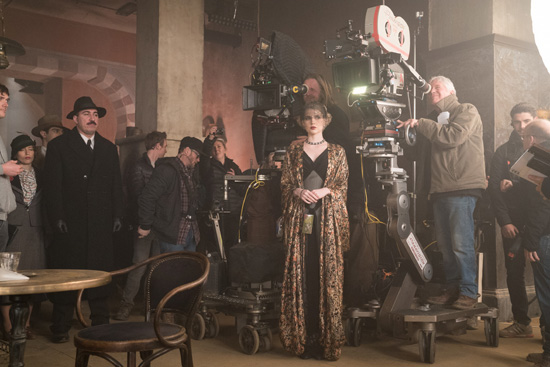 Costume Designer Alexandra Byrne’s impeccable eye for this precise look
dramatically enhanced Poirot’s presence on screen. "The first discussion was
about the moustache, so that started with Ken and Carol Hemming and helps to
define the character,” says Byrne. “Then I joined in, with Ken being very
keen that Poirot had a military background. We did a lot of research on what
that meant, to be a Belgian with a specific military background. We worked
towards his vanity being a “vanity of precision” rather than a peacock
vanity— we felt that Poirot would have developed a style of suit that worked
only for him. He's not interested in fashion - he has his style, he has his
tailor, and that's who he goes to. He has two suits and an evening suit,
which is about right for a man of his class. They're beautiful, they're
honed down to the precision of what he feels is right, and there's this
absolute symmetry and tidiness, so that when he's in a fight and his collar
gets disarranged or a button comes off, that is deeply distressing and
unacceptable to him." Costume Designer Alexandra Byrne’s impeccable eye for this precise look
dramatically enhanced Poirot’s presence on screen. "The first discussion was
about the moustache, so that started with Ken and Carol Hemming and helps to
define the character,” says Byrne. “Then I joined in, with Ken being very
keen that Poirot had a military background. We did a lot of research on what
that meant, to be a Belgian with a specific military background. We worked
towards his vanity being a “vanity of precision” rather than a peacock
vanity— we felt that Poirot would have developed a style of suit that worked
only for him. He's not interested in fashion - he has his style, he has his
tailor, and that's who he goes to. He has two suits and an evening suit,
which is about right for a man of his class. They're beautiful, they're
honed down to the precision of what he feels is right, and there's this
absolute symmetry and tidiness, so that when he's in a fight and his collar
gets disarranged or a button comes off, that is deeply distressing and
unacceptable to him."In bringing Branagh's version of Poirot up to date, there was room to make him more nimble than previous incarnations. Equally cerebral. But with a touch more brawn and agility. Enter Stunt Coordinator, James O'Donnell: “I spent some time thinking about how we could get Poirot involved in the action without making it stand out too much with an audience,” recalls O’Donnell. Having spoken to Ken, I wanted Poirot to be an Aikido master with a cane, which was someone who was masterful, not only with the way he analyzed and interpreted crime, but even in the way he fought. He wouldn't go fist to fist, he would be clever, like David vs Goliath, which fitted in well with the character." |
|
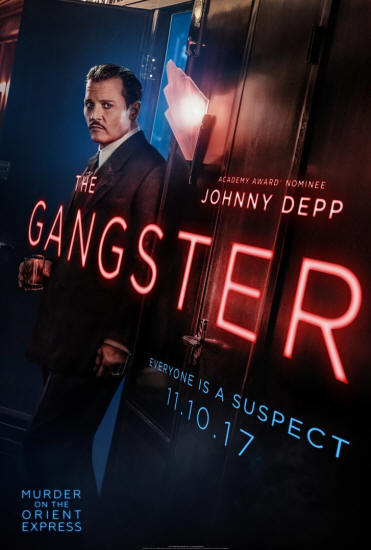 THE
GANGSTER (“Edward Ratchett” – Johnny Depp) THE
GANGSTER (“Edward Ratchett” – Johnny Depp)While many of the characters in the film are grappling with the lines between good and evil, Ratchett is seemingly the one inherently evil character on the train. "Ratchett is a gangster, a small-time gangster, it seems, who is on the train with his secretary and his butler,” says Kenneth Branagh. “He has money, but he does not have peace of mind.” Ratchett is disturbed and unsettled, as someone is after him, and he becomes aware of it through a series of provocative notes, threatening messages that are found on the train. He seeks Poirot's help, and it is not an easy conversation between him and Poirot. In turn, audiences can see Ratchett is not going to have an easy journey on the Orient Express. “From the second Ratchett enters the story, you can sense his paranoia and his urgency to befriend Poirot and protect himself,” says Depp. “The elegance of the train, the gangster swagger of Ratchett combined with his greasy confidence culminate into an extremely compelling and amusing character to play.” Branagh describes Depp as bringing: "A wonderful, seedy glamour to this very sharp-minded, clearly dangerous, and clever mobster. Johnny's performance is dark, it's dangerous, and it is very funny." “In many ways, he’s the antithesis to Poirot, which makes their exchanges so tense,” says Depp. “Ratchett wants the respect of Poirot, but he’s never going to get it.” RATCHETT You’re the world-famous Hercule Poirot. Avenger of the innocent. Isn’t that what they call you in the papers? POIROT And you are an innocent? RATCHETT (laughs) You’re fun. “Johnny Depp oozes charisma and charm and confidence and is the loveliest, sweetest and most fun co-star you could imagine,” offers Josh Gad. “And then he can turn on this character like Ratchett, who's the complete opposite in every way, and it's incredible to watch. It's become an expectation now, that every time Johnny creates a new character, you're so excited to see what that's going to look like. Each one has so many layers, physically and vocally— he's able to identify it so specifically." |
|
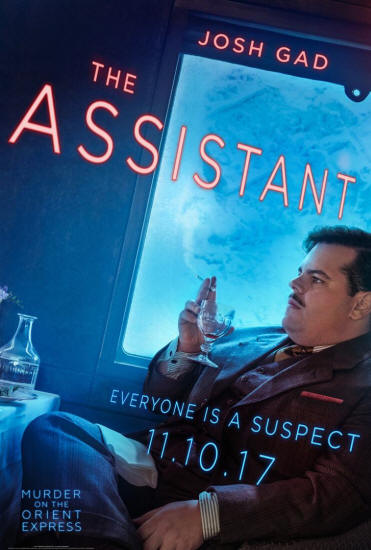 THE ASSISTANT (“Hector MacQueen” - Josh Gad) THE ASSISTANT (“Hector MacQueen” - Josh Gad)Hector MacQueen is Ratchett’s secretary and a very nervous individual. He is well-traveled and scholarly, trained as a lawyer, and fluent in many languages, but is not a happy man, and prone to excess. “He seems to drink and smoke a little more than is good for him, and he seems unsettled,” says Branagh. The role was a departure for Gad who understood the dynamic between MacQueen and Ratchett. "MacQueen is a complicated guy,” says Gad. “He's got a story which seems fairly obvious, but then there’s what's going on behind all that. He is sort of a slave to Ratchett. He is a trembling, insecure secretary to this rather abusive boss who expects a lot of him, and demands even more." “Josh has a fantastic naturalism in the part. We know how funny Josh can be, and of course he's very musical as well,” says Branagh. “Here, he plays something with great simplicity and vulnerability. McQueen is someone who feels, in some way, as though some damage or some wounds have occurred in his life, that, Josh, in the performance, seems to wear very lightly. It makes him very intriguing, and it makes the little trio of Ratchett, Masterman, and McQueen a very tight-knit but also conflicted group. They are an electrifying trio." In talking through the character with Branagh, Gad explains how much back story was necessary to truly embody MacQueen. "We went into great detail about who this guy is, what his upbringing was - where does he come from? How has he gotten to this place? The beauty of this film is that you think you know what you know, but you don't know anything. And MacQueen is just one piece of the puzzle." |
|
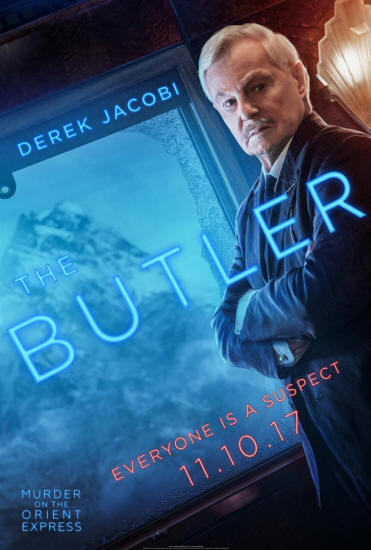 THE BUTLER (“Edward Masterman” - Derek Jacobi) THE BUTLER (“Edward Masterman” - Derek Jacobi)Masterman is Ratchett’s trusted butler. He appears to be entirely obedient and subservient - very English, and very polite. But, in the hands of Derek Jacobi, he's played more as an officer from the military with a cockney swagger and a no-nonsense demeanor. “We understand that Masterman can be very kind and very solicitous,” says Branagh. “And he is very strict about performing his duty, but we also know him to be something of a tough guy himself. He is a man with a beautiful question mark over him.” Jacobi and Branagh have collaborated many times on theatrical and film productions. When he was asked to play Masterman, Jacobi accepted without hesitation. “He’s an interesting character,” says Jacobi, “he was a batman during the war, and then a valet, and now he's a valet to a rather unsavory character in Ratchett. Masterman is a bit uptight, but he's also very ill, probably dying, and also has a degree of revenge somewhere in his psyche.” “Derek has the ability to play and suggest many layers of dimension in that kind of person,” observes Branagh. “Derek’s an East Ender himself, so it was nice for him to play an English butler, not as a sort of constipated character, but more of a sleeves-rolled-up kind of individual, who could take care of himself and his master, if he needed to.” At Branagh's behest, Jacobi played the role with an East London accent. “I quite enjoyed it,” says Jacobi, “as I think I'm sometimes considered a bit posh as an actor, you know: classical and Shakespearean, so it's very nice to come down to earth occasionally!" |
|
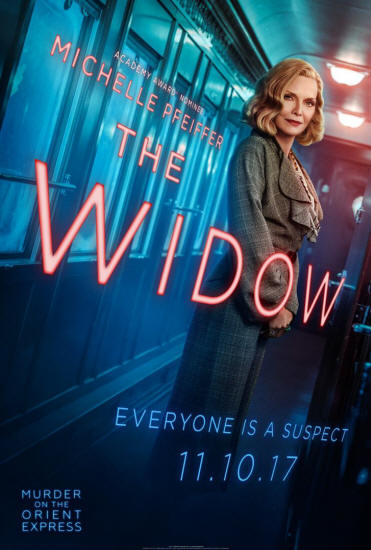 THE WIDOW (Caroline Hubbard - Michelle
Pfeiffer) THE WIDOW (Caroline Hubbard - Michelle
Pfeiffer)Michelle Pfeiffer dazzles as Caroline Hubbard— a kind of character that Agatha Christie met numerously on her own travels, and is often quite ruthless about describing. "Hubbard is a husband-hunter,” offers Pfeiffer. “Or so she says. In some ways she’s a lonely, and rather sweet, and tender, and often funny woman, but she can be very forceful, and to some people a little irritating and a little intense. It was fun to step into her shoes.” "Michelle charts the sort of inner loneliness that Agatha Christie knew well,” says Branagh. “The challenges of being a woman alone, and travelling in difficult circumstances. Once on the Orient Express, with all of its glamour, in the golden age of travel, it was different. But to travel in the Middle East at that time was a challenging thing. And so, the intrepidness, the pioneer that is Christie is in Caroline Hubbard. And with Michelle Pfeiffer, who is also a tremendous comedienne, there is also a wonderful sense of fun." “What you look for in a role is range,” says Pfeiffer. “Where there’s humor and levity and then, where does it turn? You want to build to those moments. And that was one of driving forces for me coming aboard. And the period… the costuming was magical, and so elegant. There is such an appreciation for style and glamour and you really walk away with a sense of that after seeing this film.” Costume Designer Alexandra Byrne described dressing Hubbard as: "The most fun, and the most challenging, because she's described as a woman who we hear coming before she enters the room, and she's too big for the space. That's quite difficult to pull off on film because it's about creating a character with a lot of contradictions that don't all add up in the same direction. She's got to be credible - extraordinary, but credible. When we first meet her, we've got to believe in her and we've got to like her and be invested in her." |
|
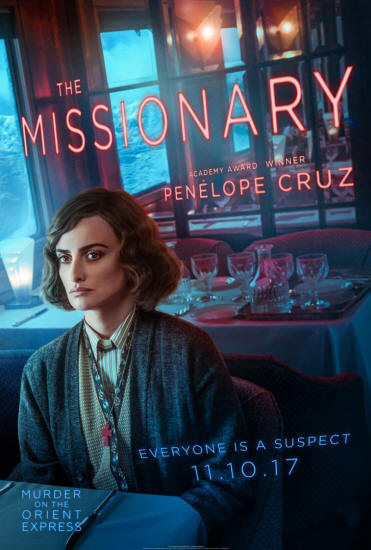 THE MISSIONARY (Pilar Estravados - Penélope
Cruz) THE MISSIONARY (Pilar Estravados - Penélope
Cruz)Pilar Estravados is the name of a character who appears in another Poirot story, Hercule Poirot's Christmas. However it is just her name, and not her character traits that have been “borrowed”! “In our delightful and delicious attempts to surprise people with the plot, and following consultation with Agatha Christie Limited who are the guardians of her work, we allowed the character of Greta Olson to make an exit, and the character of Pilar Estravados to make an entrance,” said Branagh. Penélope Cruz plays the impassioned, intense missionary with a zeal to travel the world and do what she can to improve an imperfect world - both spiritually and philosophically. There is both a dedication and a mystery about her: "At the beginning of the story we don't know much about Pilar,” acknowledges Cruz. “Just that she seems very religious, because she walks around with her bible and her cross, and she loves talking to people about God and about the reasons why this is so important in her life. But she only shares some of her reasons. She has a scar, and skin that has been damaged from who knows what. The scar represents her biggest trauma, and has made her become a different person. When the trauma happened, she changed her lifestyle in many ways. She's a very damaged person, and she's finding relief and a reason to live by helping other people and becoming a missionary." Often cited as one of the most beautiful women in the world, in this film, Cruz plays a character who seems bent on hiding her beauty. The look and feel of her character is austere and solemn. Costume Designer Alexandra Byrne was able to demonstrate Pilar's character through her costume, as she explains: "She is a woman who wants to deny any femininity, so her clothes have to have a practicality about them. I pulled pieces from a costume house in Canada where they had these amazing robust travelling culottes, and it seemed perfect, as for a woman in the 1930’s to wear trousers was actually quite a fashion statement, but these culottes seemed like a perfect balance of practicality and a non-sexual item of clothing." |
|
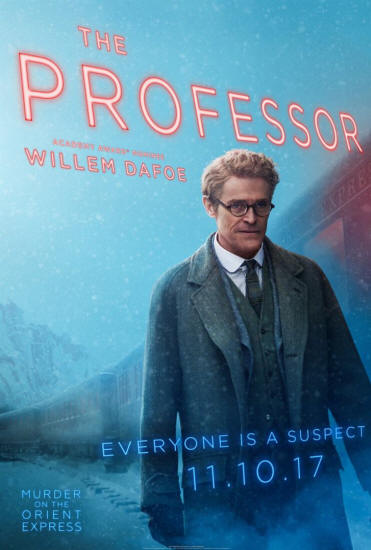 THE PROFESSOR (Gerhard Hardman - Willem Dafoe) THE PROFESSOR (Gerhard Hardman - Willem Dafoe)The arrogant Professor Gerhard Hardman annoys his fellow travelers almost immediately. His political views, as they are revealed, seem odious to the passengers, but he is impervious to their feelings. Instead, Gerhard is very particular about where he sleeps, what he eats, what he does. “Gerhard has a favorite subject to talk about, which is himself,” jokes Branagh. “He's a provocateur and a dangerous individual, because he's a catalyst to make other people argue, and sometimes bring them into conflict.” To play this complicated character, Branagh turned to Oscar-nominated actor, Willem Dafoe. “Willem has a knack for making unlikeable people likeable,” says Branagh. “He’s unafraid to get caught in the trap. There is a joy in watching him squirm out of situations, once he is caught.” "When we meet Hardman, he's an Austrian Engineering professor who is on his way to Turin to give a speech on the military uses of Bakelite,” said Dafoe. “He's a man that expresses opinions that are often offensive to some of the other passengers, because he's very aware of place and hierarchy and race. Given that it's 1934, in Europe, he's quite buttoned-down, quite a serious guy, and someone to watch." Poirot seems to catch on that there’s a game that Hardman is playing, but the question is, why is he playing it? One of the earliest suspects, Poirot seems to track every syllable of Hardman’s bluster. "A key point in the story is that the characters are not who they appear to be, and Hardman is no exception,” said Dafoe. |
|
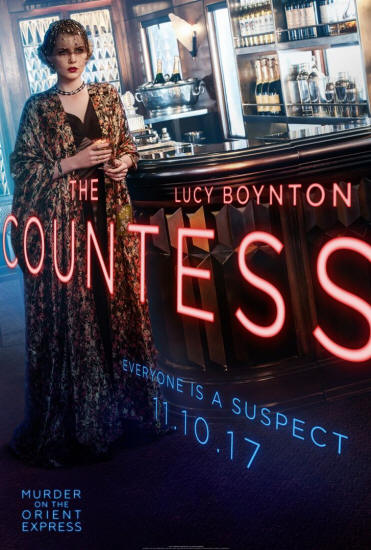 THE COUNTESS (Countess Andrenyi - Lucy
Boynton) THE COUNTESS (Countess Andrenyi - Lucy
Boynton) The Countess Andrenyi is married to the Count Andrenyi, and they are both ballet dancers. He is Hungarian, and her background is not exactly clear. What is clear, is that she is subject to some kind of addiction or disturbance that keeps her out of sight of the travelers on board the Orient Express. She makes few appearances, and when she does, they are dramatic and telling. “Lucy, who is a very beautiful and talented actress, really found a way to inhabit this character's loneliness and isolation, and intrigued us as to what the reason for that was,” says Branagh. “We see her early on, and we are keen to know more about her, and then we're denied that access, by the story, and by Agatha Christie, only heightening our desire to know more. It intensifies the shock when we do see her. And Lucy manages to, even inside a very, very dark part of the story, have a kind of a playfulness with the character, and particularly with Poirot, whom she finds absolutely ridiculous." "The Count and Countess are both illustrious ballet dancers, although in the last few years the Countess has taken to consuming copious amounts of barbitols, so she's a slightly woozy ballet dancer,” jokes Boynton. “She has a beautiful relationship with her husband, who is played by Sergei Polunin." Boynton continues, "You can tell that their relationship is very passionate and that they're very much in love, and rely on each other a lot. Since she has delved into this slightly sleepy state of drug addiction, she has become very dependent on him, and he handles her so gently. It's sad to see her withdrawing from herself and her world, but there is constant love and reliance that shines through.” Boynton was keen to immerse herself in preparation for the role: "I started taking ballet lessons, because they're both ballet dancers - although you don't see her dance because she's very woozy and unstable by the time we meet her. I just wanted that foundation in posture and gait, and so I could stand next to Sergei without feeling terribly embarrassed. It was really informative and helped bring her to life and to build her character." Boynton’s costumes for the Countess were made up of beautiful vintage fabrics, although it isn’t always clear what type of garment she is wearing and why: “Because the Countess is also nocturnal, as a result of her drug taking, the outfits that she is dressed in are both day and night - so you can't quite work out whether she's in pajamas or a gorgeous satin two piece,” said Boynton. “It's been a lot of fun putting it all together, and a total dream to wear." |
|
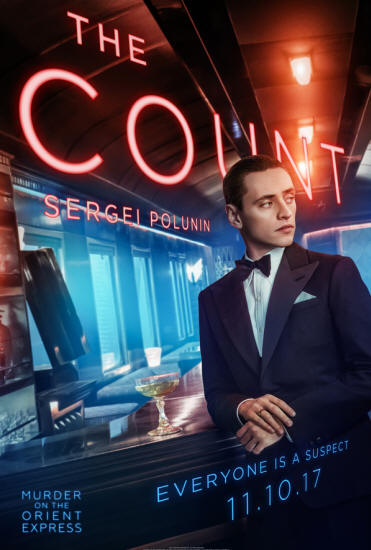 THE COUNT (“Count Andrenyi” - Sergei Polunin) THE COUNT (“Count Andrenyi” - Sergei Polunin)The Count Andrenyi is a renowned dancer, and Branagh contends “we were very fortunate” to have cast Sergei Polunin, who is a “magnificent” dancer. Polunin’s capacity for movement of a certain kind, especially through a violence that we see expressed in this character, makes him very distinct. "Andrenyi is very protective of his wife and he feels every step she takes,” says Polunin. “They are on the verge of splitting up because she has a problem that he must resolve - he just wants things to get better for her. She is a source of light in his life and he doesn't want her to go into the darkness." “You really get a sense of the performer that he is,” says Branagh. “There is a grace and a danger and a deftness about the way that he moves that is very electrifying, very unsettling." With his background as a ballet dancer, the role of Andrenyi marked Polunin's first foray into acting. Polunin enjoyed finding his character with director Branagh and his co-star Lucy Boynton. Polunin explains: "Kenneth is really precise with what he wants and asks interesting questions to achieve this, such as ‘What did Andrenyi dream?’ ‘What was his past?’ ‘What are his feelings towards his wife?’ It was really interesting for me to develop the character in such a way and it gave us artistic freedom." "Sergei brings a fine acting talent, and a really memorable physical presence to the role, along with an intrigue, and a dark and deeply romantic quality," offers Branagh. “He has this Slavic kind of soulfulness that makes you feel strongly that were you to go anywhere near his woman, there would be trouble afoot. And trouble is afoot because Poirot investigates them.” Adds Lucy Boynton: "I would never have guessed that this was Sergei’s first acting job, because he's so beautifully composed, has such great self-possession and all the discipline that comes with being a dancer. He's a brilliant partner to bounce off and play with." |
|
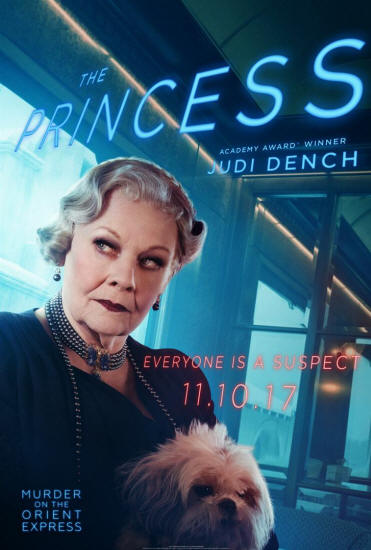 THE PRINCESS (Princess Natalia Dragomiroff -
Judi Dench) THE PRINCESS (Princess Natalia Dragomiroff -
Judi Dench)When we meet Princess Dragomiroff, we are introduced to Russian royalty who seems to have a hard time coming on to the Calais coach, because it is somehow feels beneath her standards. In such a role, we find legendary actress, Judi Dench. “I think Judi Dench had a whale of a time playing Dragomiroff's imperious, contemptuous, superior arrogance and disgust at most of what went on around her, which was never as she liked it,” offers Branagh. “Never quick enough. Never soon enough. Never hot enough. Never nice enough. And when she wasn't complaining about what wasn't right, she was demanding that her dogs be looked after. It allows for a chance to see a character who is very stern, and very forbidding, to also be naughty and funny. Judi Dench is somebody who can play all of those things with great delight. At the same time as formidable as she is funny, she can also be very secret and hidden.” Costume Designer Alexandra Byrne was honored to create costumes for Judi Dench. "The great thing about Judi is that she has these amazing twinkly eyes, and playing a Princess, she would have a lot of jewelry, that she had managed to get out of Russia during the revolution and had maybe repurposed,” says Byrne. “I took quite a simple line on her clothes so that the jewelry and her eyes could really sparkle." |
|
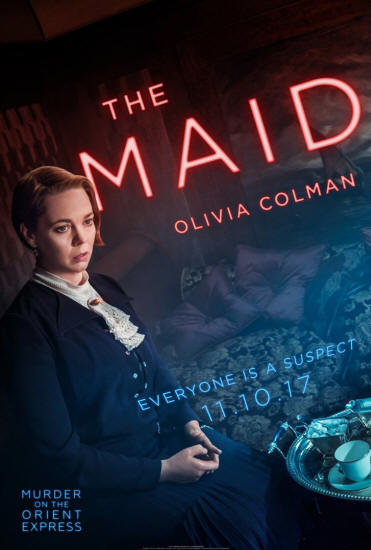 THE MAID (Hildegarde Schmidt - Olivia Colman) THE MAID (Hildegarde Schmidt - Olivia Colman)One of the many personal dynamics at play in the film is the servant/master relationship. We see it with Ratchett and MacQueen, and as well with Princess Dragomiroff and her maid, Hildegarde. Agatha Christie, and in turn Poirot, is constantly exploring the complexities of these relationships. Hildegarde Schmidt works for the Princess Dragomiroff as her lady's maid. She cooks for her, manages her wardrobe, and her sharp personality, which is constantly to complain, it would seem. She has a thick skin, so thick, as Branagh describes “so as to not be broken and squashed by what would probably traduce most other people.” Hildegarde is polite and clearly intelligent, but she's quiet. She's discreet to the point of making you wonder whether she has a lot to hide. Poirot wonders, “Does she know something we don't?” “Hildegard has a sort of secret and hidden strength, or, dare I say it, does she have something over the princess?” says Branagh. To bring the role to life, Branagh turned to acclaimed actress, Olivia Colman. “Still waters run deep,” notes Branagh. “And with Olivia Colman, of course, just in repose, you see this woman listening, and you are intrigued and compelled." |
|
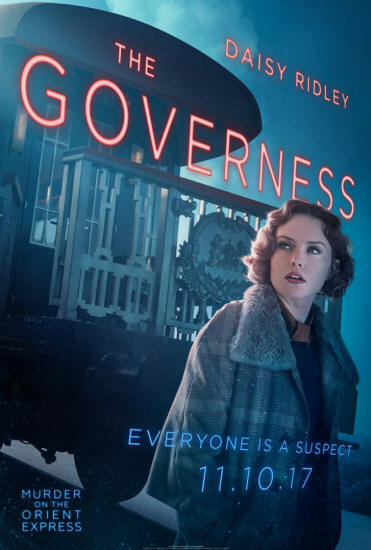 THE GOVERNESS (Mary Debenham - Daisy Ridley) THE GOVERNESS (Mary Debenham - Daisy Ridley)Daisy Ridley joins the illustrious ensemble as Mary Debenham, a governess with a penchant for photography. "Agatha Christie seems to me a very modern woman,” says Branagh. “Everything about her own biography is trailblazing really, and Daisy is a very sharp, intelligent, funny, engaged, interested and curious person. I feel that appetite for interest in other people and things is something she really had. Daisy brings that to it, and bring that energy to Mary Debenham, creating a very forward looking and thinking, and rather new and daring individual." Adds Daisy Ridley: "When we first meet Mary she is a free-spirited young woman, who is travelling, seemingly alone, a governess, and she likes taking pictures. She has a wonderful exchange with Poirot at the beginning of the film and it sets off a really nice dynamic between them, that drives through to the end." "I think the character of Mary Debenham is maybe closest to a version of Agatha Christie,” suggests Branagh. “She's about the age that Agatha Christie was when she did one of her world tours, with her first husband - the tour on which she learnt to surf in Hawaii - the first English woman to do so, I'm led to believe. It gave her the sort of pluckiness and the intrepid pioneering spirit that she imbues Mary Debenham with. And Daisy Ridley brought a terrific modernity." |
|
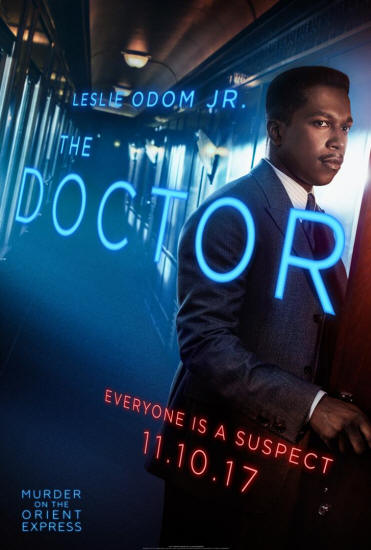 THE DOCTOR (Dr. Arbuthnot - Leslie Odom, Jr.) THE DOCTOR (Dr. Arbuthnot - Leslie Odom, Jr.)On an ordinary journey, Leslie Odom, Jr.’s turn as Dr. Arbuthnot would be a kind of stalwart or an anchor on the train, as doctors often are. In difficult situations, they are brought in to be the professional voice of reason, and a compassionate and counselling voice. But this journey is far from ordinary. "Arbuthnot is a former soldier, and he's a doctor,” said Odom, Jr. “We worked really hard to be as specific about that as we could, about who this black man might have been in order to achieve what he'd achieved, what he would have had to go through to get to where he was and what the circumstances of his life might have been in order to have a last name like Arbuthnot.” “Leslie Odom, Jr. has this wonderful intimacy and warmth and compassion and plays the character with great tenderness and sensitivity, bringing to Dr. Arbuthnot both what you might expect from a doctor, but, also more of the soul of a romantic,” offers Branagh. “That romantic disposition is something that may be at work, and in the service of one of the other characters on the train, and to that extent, he has to hide it. His ethnicity at that time is something that the story explores, and Arbuthnot has to display the courage to be different in a difficult situation, and defend himself, both literally, and philosophically. He becomes a fascinatingly complex character, who is pivotal to the action." The rich backstory offered Odom, Jr. the opportunity to collaborate on his character’s past with Branagh, Hair and Make-up Designer Carol Hemming and Costume Designer Alexandra Byrne. “Alexandra was great in her research in finding pictures and information that we could glean from a bunch of people's lives to make Arbuthnot’s life as specific and rich as we possibly could,” says Odom, Jr. "He's an ex-military man,” adds Byrne, “with English tailoring, but a man who's not had a lot of money at his disposal, and I think being black and being a doctor he would be very correct, and wouldn't want to break any rules or step out of line. The most important thing about the English style of dressing of the period was that you did not overstep your class." |
|
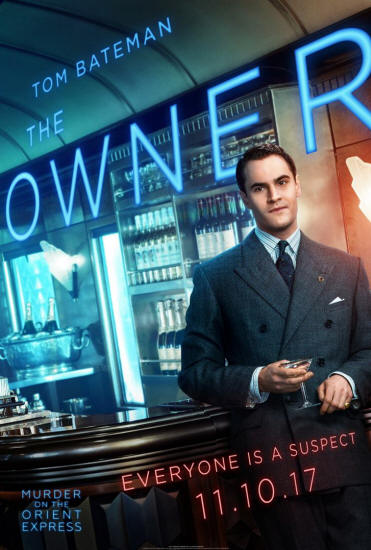 THE MANAGER (Bouc – Tom Bateman) THE MANAGER (Bouc – Tom Bateman)Tom Bateman had worked with The Kenneth Branagh Theatre Company at the Garrick season, where he performed in The Winter's Tale and Harlequinade and was honored to have the chance to play Bouc, who has been reinterpreted from his original incarnation in Christie's novel, as Bateman explains: "In the book, he is a contemporary of Poirot's. He's supposed to be the same age, French, and they are these two older men talking and laughing about the world. We've flipped that and given it an interesting dynamic where an older Belgian man and a younger Englishman have this sweet fondness for each other. In my mind, they have a common view of the world - they both see the good and bad in things - and they match each other in that way." Branagh also acknowledges the friendship between Poirot and Bouc: "Monsieur Bouc is the director of business on the Orient Express, and when we meet him, he's very much not involved with business. He's involved in leisure, with a young lady who he's spending brief but quality time with in the kitchen of the Kiraz Restaurant, just before they board the Orient Express. However, he is thrilled to find his old friend Poirot, an unlikely pal, but the two of them seem to respect each other. Poirot has great, great affection for him. Bouc is the life and soul of the party. During the course of the film, his innocence is taken away, by suddenly becoming responsible for a train where a terribly violent crime has occurred, and which is stuck in the mountains. It's a crisis for him, he may lose his job, and if this murderer stays on the loose, he may lose his life.” “Bouc is a bon vivant, a lover of life and has a wonderful job,” observes Bateman. “He has no qualifications, but he can charm people and make them feel comfortable and excited, until the murder happens on the train and then suddenly we see a different side to him.” From the lightness and frivolity of the opening scenes of passengers boarding the Orient Express to the graveness of the murder, Bouc goes through a character arc that is heavily influenced by Poirot. He begins to care about things that he perhaps wouldn’t have seemed likely to care about at the beginning of the story. "Tom Bateman's performance has a wonderful, easy, light, debonair charm, and then a gravitas that is born out of having to face a very dark situation, and see it for what it's worth,” says Branagh. “It's a lovely performance, and the scenes we share are very natural and instinctive.” |
|
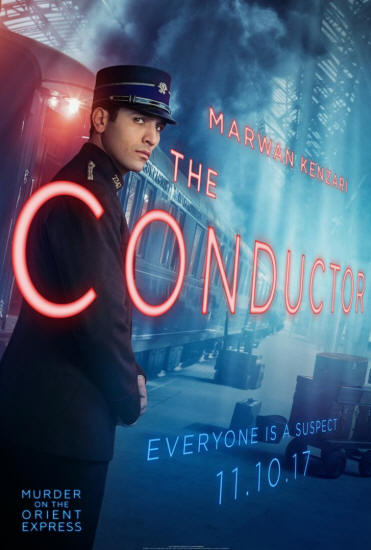 THE TRAIN CONDUCTOR (Pierre Michel - Marwan
Kenzari) THE TRAIN CONDUCTOR (Pierre Michel - Marwan
Kenzari)Pierre Michel of Avignon is the train conductor, and unwittingly, thrown into the role of a suspect, even though he feels fooled at having been on duty all of the night in which the murder could have taken place, and in which he should surely have seen it. "Pierre Michel carries heartbreak and pain, as his mother, and not long before, his sister, have passed away. He is a character with a great sort of sadness, trying to do a job under pressure,” says Dutch actor, Marwan Kenzari. “Marwan brought that sort of tenderness to bear, and could be sensitive without feeling weak,” said Branagh. “He also gave the impression of having great pride in his job as a conductor of the Orient Express, and therefore, tremendous professional shock and horror at being potentially accused of being involved in a crime." Adds Kenzari: "Pierre Michel is the conductor on the train who takes care of the first-class customers on the Calais coach, where much of the film takes place. He has been part of the company for quite a while and takes his job seriously. In my imagination, I would see him spend most of his time at work. He's an important piece of this chain of extraordinary events, because he has access to all of the compartments and that makes him a valuable commodity." |
|
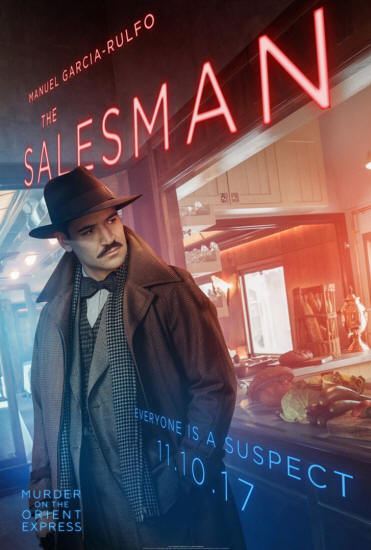 THE RED HERRING (Biniamino Marquez - Manuel
Garcia-Rulfo) THE RED HERRING (Biniamino Marquez - Manuel
Garcia-Rulfo)Biniamino Marquez played by Manuel Garcia-Rulfo is another new character who helps throw the audience off the scent, especially those who may feel they know this story. Marquez seems to harbor a secret. He isn't entirely straightforward and that becomes clear early on, quickly making him a target of Poirot’s watchful eye. “We've had a chance to tickle a few things, to just do what Agatha Christie always wanted to do, which was to keep people guessing until the very end,” said Branagh. “And Manuel Garcia-Rulfo is a terrific actor, who has a wonderful warmth and kindness. And he delivers a lovely performance, of keeping the audience, and keeping Poirot, constantly guessing as to whether he's the genuine and compassionate man we think, or whether there may be far more to him than meets the eye.” |
|
|
THE PRODUCTION DESIGN OF MURDER ON THE ORIENT
EXPRESS The billows of smoke from the train’s engine. The massive snow drifts ominously approaching the train tracks. The sparkle of the fine silver glistening in the dining car. The fine woods, leather and china that adorn the Calais Coach. The pop and pour of Veuve Clicquot. The single shot of a gun. These are a few of the indelible images that permeate the exquisite production of Murder on the Orient Express. For fans of Agatha Christie, this production takes you in to all facets of the infamous train. For newcomers, they can savor every detail of a location which captured the world’s attention over 80 years ago. "The look of the film is great, with brilliant choices as to location, in that it's not all set on the train,” says Derek Jacobi. “There's a lot that takes place off the train." "Ken wanted to interview each character in a different location, inside the train and outside the train. I think what he wanted was this idea that the train is stuck, it's not going anywhere, and we can play in and around it,” said Tom Bateman. “So we go underneath the train, out the side of the train, running through it and even on top of the train." For Branagh, the creative team around him is of utmost importance in sustaining the level of detail and accuracy that he looks for. He explains: "The great thing about having worked with a number of people on a number of occasions is that you build up a rapport, a shorthand, and artists like Carol Hemming, Alexandra Byrne, Haris Zambarloukos and Jim Clay, are all interested in storytelling, inside their particular craft." Production Designer Jim Clay was thrilled at the prospect of working on the film and imbuing it with new life. He explains: "It's a complicated story and essentially a sedentary story, on a stranded train. But I knew that the challenge was to bring it up-to-date and help to heighten the drama as much as possible, breathe some air into that train. So the first conversations we had were about where the train was stranded following the avalanche. It's written as a mountain pass, but we extended that to be on a viaduct. Clearly Poirot in the script was going to be a younger, more agile character, and there were chase sequences, which we incorporated down the viaduct, and this immediately started the creative juices... it's not hard when you get this quality of writing and the knowledge of what this director has done in the past - you know you're off and running." Leslie Odom, Jr. has worked extensively in theatre and was extremely impressed by the level of detail in the production design of the film. He explains that in the theatre, "It’s about the leap that you take, it’s about the holes that you fill in. But film, so much of it is really about that attention to detail. When you’re dealing with people who you know are caring about every napkin and window pane and all the linen on the table and every piece of china, it feels like time travel every time you step onto set, and it feels like a great deal of the work has already been done for you. You just inhabit the space." |
|
SHOOTING
ON 65MM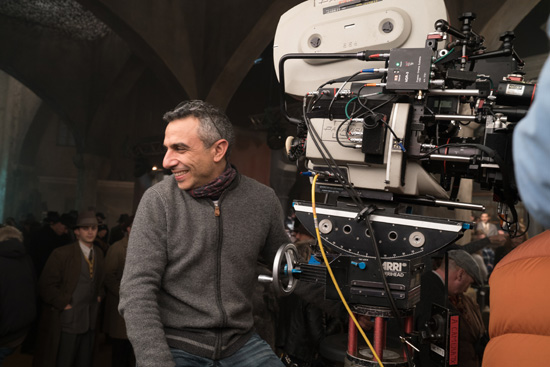 CINEMATOGRAPHER
HARIS ZAMBARLOUKOS - Frequent Kenneth Branagh collaborator, his projects
include Cinderella, Thor, Jack Ryan: Shadow Recruit and Mamma Mia. CINEMATOGRAPHER
HARIS ZAMBARLOUKOS - Frequent Kenneth Branagh collaborator, his projects
include Cinderella, Thor, Jack Ryan: Shadow Recruit and Mamma Mia. The level of detail was particularly important as the film was shot on 65mm, a format which heightens every element of the filmmaking process. "In our digital age, it's increasingly rare for films to be shot on celluloid, and mostly when they are, it's 35mm,” said Branagh. “We are shooting on 65mm. So, in crude terms, it's twice the size of the 35mm negative. It allows for a level of definition in the color and the range of tones and contrasts in the movie that, if you like film, some would argue, echoes more the experience of the human eye when viewing things. It essentially means, in layman's terms, that it looks sharper, richer, more colorful, and it feels like you're inside it. That's what 65mm does for me, and I wanted to take the audience onto the train. That's why we chose that format." For Executive Producer Matt Jenkins, the challenge of shooting on 65mm was even more far-reaching. He explains: "It’s rare these days that people even shoot on 35mm, so, we just took it one step further and found the biggest film format we could. From a production point of view, it was extremely challenging because there’s no UK laboratory to process the film, the only laboratory was in Los Angeles, and the studio was very against us – quite rightly – having to ship our negative halfway around the world every night. So, in the end, I opened up a lab in London, through Kodak, which is the first 65mm lab we’ve had in the UK for probably 30-odd years. This should be of huge benefit to the industry going forward, and it put the studio’s mind at ease that we wouldn’t be shipping our negative halfway across the world and that our rushes were safe." Jenkins continues: "What it brings to the movie, we hope, is a real sense of scale and feeling and emotion. I think we may have lost some of that had we gone the digital route. With 65mm you see twice as much, so for the likes of Haris Zambarloukos, Alex Byrne and Jim Clay, they essentially had twice as much work to do, as we’re having to light much more than you would normally see, but with that came the chance not to just build sections of Stamboul Station, but build the entire Stamboul Station, because there was the possibility of seeing the entire station with a film format that was so large that we could really fill every single frame and put as much life in as we possibly could." The film also has some record-breaking statistics, as Jenkins explains: "Haris and Ken dreamt up this sublime Steadicam shot which would be the last shot of the film. I believe it's a world record for the longest Steadicam shot ever on 65mm film. We rehearsed and rehearsed it and spent the whole day trying to get the shot, which we did, on the final take." Kenneth Branagh describes the shot: "One of the really powerful parts of the film, having produced a very emotional reaction to the discovery of who has performed this violent act, who has died, who really has died, and who is responsible for it, is to then be faced in Poirot's case with a really significant, morally complex decision about what he is to do about it. And, so, the last beat of the movie is an invitation to the audience to ruminate on the same thing. So, we have a shot that begins with Poirot in his carriage, and follows him all of the way down the entire length of the train, meets all of the actors, every single one of them, turns around, allows us to understand what Poirot may or may not do, and then follows him out. As he gets off at Brod Station, and meets a young soldier who tells him that there's another problem and another murder he may have to face, it's at that point that the Orient Express, also in the same shot, leaves. Poirot has to decide whether he's going to get back on or follow another murder, if we believe this one has been satisfactorily accomplished. That involves so many moving parts. All of the actors, all of the crew, hiding, a real train, really arriving, really leaving, and a Steadicam shot that lasted probably five minutes, with a very heavy piece of equipment, finally ending up a hundred feet in the air. I think it works and was a very exciting thing to do, but mostly, because the question mark at the end of the film invites it." |
|
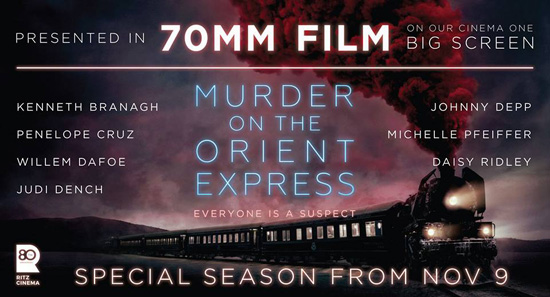 BUILDING THE MOUNTAIN BUILDING THE MOUNTAINThe film was primarily shot at Longcross Studios, west of London. A former Ministry of Defense tank testing site, the studio has several stages, a test track and a substantial back lot, which gave Production Designer Jim Clay enormous scope to build his sets. Explains Executive Producer Matthew Jenkins: "Working with Jim Clay has been a fantastic experience because his vision is second to none. He has had his work cut out on this picture, as not only was 95 per cent of our work in the studio, but also shooting everything on 65mm meant that every minute detail had to be perfect because the camera sees everything, and sees everything wide. So, Jim built a full 360 degree Stamboul Station set, a 360 degree Stamboul Bazaar, two working replica Orient Express trains and a 30-tonne full scale replica locomotive, as well as an enormous viaduct set." Writer Michael Green was delighted that the scale of the film could be amplified: "In the original novel we have a snowbound train just in and of itself. For the script, we wanted to enhance the ideas of the book, whilst still honoring them - not necessarily change them, but just inhabit them a little more deeply. So, in the novel, the train becomes snowbound. In this film, it becomes a little more thrilling, in that the passengers become snowbound in a fairly precarious place - a creaky, viaduct bridge, which is the last place you'd want to be stuck for any length of time, because at any given moment you're hearing the creaks and groans of ancient wood, plus it completely removes the possibility of escape." Adds Branagh: "It's exciting that Agatha Christie chooses this confined space in which to trap her characters. But we wanted to expand the range of that train to see that if the train was, via a violent avalanche, trapped on top of a viaduct, which, in itself, was potentially precarious, and where there was great jeopardy inside a stretch of mountain too high for anybody to easily get down by walking. That did a couple of things. It expanded the idea of a different kind of trap, in that you're not only in a trap of the train carriages and then the little rooms themselves, but, also, on this mountainside with a vast amount of precipitous danger around you. It allowed us to get the characters and the camera outside, and to see a sense of the scale of this thing where this deep, dark, intense, tiny tragedy was happening. So, Jim Clay responded brilliantly to the idea of making where the train was trapped, then the landscape around it, as exciting as what was going on inside the train." Clay built a mountain 35 feet high, with digital extensions that make it appear much higher. A set of this magnitude required the involvement of structural engineers in the design to ensure its safety, given a train would rest and ride on it. Adds Matthew Jenkins: "Originally, the avalanche hit occurred in a wooded environment, but early on in the process, Jim Clay thought that it would be good for our avalanche to take place on a viaduct. Given that quite a big percentage of our film takes place when the train has been hit by this avalanche – it just made sense to spend a lot of resources and energy in making this viaduct as big and epic as we possibly could. So, Jim designed it and it probably stretched 200 or 300 meters from left to right. On top of that we craned our four train carriages, plus our storage car, our tender, and our locomotive, which must have easily weighed 150 tons. The whole area was then snowed up from left to right and we shot on that set for many weeks and got huge production value out of it." Agatha Christie Ltd Chairman James Prichard visited the viaduct set and claimed: "When you're up on the viaduct you can actually feel the snow - you feel that it should be colder than it is up there, because it feels so real." The snow was also a logistical feat as Matthew Jenkins explains: "We had many weeks working in snowy environments – and I’m not just talking about snow ten meters left and right – I mean, this was 100, 200, 300 meters left and right, the entire frame filled with snow, falling snow. Dave Watkins had to put a lot of work into it, as there were all sorts of different types of falling snow, from powder to snow candles to smoke. In addition, when we were on the stages, he had to devise a way of having snow move past the windows without making any noise, so, he built a very complicated ducting system, which filled the stages, to ensure that we could have wind and moving snow passing our carriage windows without anybody hearing that it was going on." The Stamboul Station set was built on Stage 1 at Longcross Studios. "When we walked into that huge sound stage and the entire interior of Stamboul Station had been recreated, it was breathtaking,” said Lucy Boynton. “The detail and the craftsmanship that has gone into it all is unbelievable. It’s all there in front of you, you're sitting on a perfect train, that actually pulls out of the station." That the Orient Express pulls out of the Stamboul Station set, is a logistical feat in itself, as Production Designer Jim Clay explains: "Stage 1 is the biggest stage at Longcross and we decided that is where we should build the station.” Production research revealed that Stamboul Station itself is actually much smaller than the team originally thought. The production team filled the stage with huge columns and platforms with two tracks. Because Longcross was originally a factory for building and testing tanks, the stage has two big doors at the end of it, which allowed for the building of the track to full length. Clay added, “Indeed it went out of the stage and into the car park and we even had to close part of the studio road. This enabled us to pull the whole of the train carriages out of the station." |
|
|
MOVING TO MALTA The majority of the film was shot at Longcross Studios, with the filmmakers travelling to Malta to capture the riveting opening scene. "The opening of our film is at the Wailing Wall in Jerusalem, and the first problem Poirot has to solve is potentially one involving a religious dispute, or that which may turn out to be such a dispute, in a very vibrant, noisy, crowded place,” says Branagh. In Malta, the production was able to find and build a wailing wall, and its environs. This allowed for this great, big, open, sun-filled, expansive vision that could open a film that eventually was going to go closer and narrower and away from the sun and into the dark and the snow. For Branagh, it was important that the audience has seen the way Poirot’s mind works before he arrives on the Orient Express. “It's one thing, having seen somebody who is referred to as the world's greatest detective in action, as opposed to merely hearing it being reported,” offers Branagh. “So, we get a chance to deliver big-screen size, yet more exotic locale, and an introduction to a man who travels the world with that extraordinary, detective, deductive mind, and we got to do it in Malta, which has incredible, ancient ruins and locations." |
|
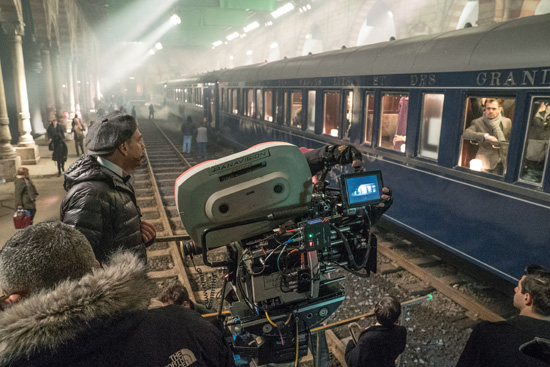 THE ORIENT EXPRESS THE ORIENT EXPRESSIn this story, the great and glamorous Orient Express leaves from Istanbul, travels up through the Dinaric Alps in the former Yugoslavia, where an avalanche stops it. Eventually it is freed, and goes via Brod through Italy, through Switzerland, through France, and ends up at London's Victoria Station. When the filmmakers started their logistical discussions on the actual shooting of the film, it became apparent that it would work much better to build their own Orient Express. "I've worked with trains before,” remembers Branagh. “And it just takes so much longer to be up a real mountain in Switzerland - stopping the train, sending it back, with one track, and fifty other trains with real passengers on them waiting to get past - than it is to ambitiously but excitingly build Stamboul Station at Longcross.” Both the station and the Orient Express were built at Longcross, then moved around allowing the production team to go inside and outside, and up and down, the slightly enlarged carriages with 65mm cameras. “It allowed us to have more control over how you present the journey,” said Branagh. We had specific research that Production Designer Jim Clay and his team provided. But then he brought his artistry to bear to bring the perfect version that suited our darker take on the story." "Right at the beginning of the job,” says Clay, “we took a journey on the real Orient Express, just to experience how viable it would be shoot on a real train. Of course, it's immediately obvious that the restrictions are huge. The corridors are narrow and we are shooting on 65mm, so a big camera and dolly tracking was not going to work on a real train. So, we made the decision to build it, and indeed we built it twice. First, we built the full carriages and locomotive, interior and exterior and fully moveable on train tracks. Then we built the same thing again, just with interiors and walls which could float out and give even more opportunity for shooting." In addition, Clay designed a number of pods, individual stand-alone sleeper cabins where all the walls and the ceiling could be taken away, in order that scenes could more easily be shot inside them. Poirot's sleeper cabin as well as Ratchett and Hubbard's sleeper cabins were all built in this fashion. Agatha Christie Ltd Chairman James Prichard was impressed with the magnitude of what had been achieved in terms of design: "The scale of the whole production is exciting - the detail in the carriages, the fact that four carriages and a locomotive have been built from scratch, to me is extraordinary." In terms of the accuracy of the train, Clay explains: "In reality, the Orient Express pulled right across eastern Europe and would change locomotive at boundaries or borders. That's not a practical way for us to tell the story in a film, so we chose one locomotive. It's based on a big French steam engine which is now based in Zurich and ours is pretty accurate and full scale, and with the collaboration of special and visual effects, to all intents and purposes, the train is the real thing." David Watkins, the Special Effects Supervisor, and his team were responsible for building the locomotive for the Orient Express in such a way that it could actually move. To that end, he sent his Workshop Supervisors Jim Machin and Jason Marsh to Switzerland to meet the curator of the only working 484 train in existence. "Jim and Jason came back with a bible - a thick, original book from the original design of the train that we were looking at, so that we could scale it correctly and we built our whole design, scaling from that book,” said Watkins. In all, Watkins and his team built a locomotive and a tender, which were practical enough to look like they were working parts of a train and the production was not dependent on visual effects to provide the atmospherics around the train. Watkins explains: "The cast can get a little more involved when they can actually smell the steam, because it smells like a real engine." Tim Parkin was the film's Train Consultant and ensured that the construction department's recreation of the train was as accurate as possible. In addition to the locomotive and tender, David Watkins and his team also constructed an entire storage car, a sleeper car, a dining car and a salon car, and as Parkin explains: "Each one weighs about 25 tons, and the locomotive weighs about 22 tons with the tender coming in at a little less. Whenever we move our train, we use a couple of diesel shunters which attach to the front of our mock up locomotive, which looks real, even though it's cheated by our wonderful Special Effects team under Dave Watkins.” Adds Executive Producer Matthew Jenkins: "We took a decision early on that we wanted to try and get as much in-camera as we possibly could. Obviously, we were making a road movie on a studio lot, so that came with some severe challenges. We didn't want to drop a carriage on a stage and drape the stage in green screen, we wanted to try and make it as authentic as possible." Director of Photography Haris Zambarloukos and a team had been to New Zealand prior to production and shot many hours of footage from a train travelling across the New Zealand mountain scape. Visual Effects Supervisor George Murphy then digitally stitched it all together and on set, two 400 LED rock and roll screens were erected on either side of the carriages and the footage was played. In addition, Special Effects Supervisor, David Watkins set about trying to give the train some movement, with the help of a rig underneath the train carriage containing air bellows and hydraulics that jolt the air, moving the train left and right as well as back and forth. He explains: "We spent a lot of time deliberating over Haris' footage and looking at what the carriage was actually doing, and the movement it created. Then through our hydraulically controlled software, we spent lots of time playing with it, and I was really impressed with the movement we were able to get from the rig underneath the train carriage." As actor Josh Gad notes: "Even on the stationed train, it felt like we're in motion, and that does a lot for you as an actor because you don't have to imagine much." For Matthew Jenkins: "It was quite surreal when you stood on the moving carriage with the footage moving left and right. It felt like you were really on a train. It was a bit like walking up an escalator that doesn't work, and you also got a bit seasick, but I think it paid real dividends." Shooting on 65mm also presented Clay and his team with numerous challenges. He explains: "65mm is like high definition, as when you see it projected on a big screen, you can see every nail head. So, the finish had to be real and our construction team produced this amazing quality of marquetry and veneer, which is absolutely and convincingly real when you sit inside it. We wanted the viewer to feel that it was a very opulent way to travel and live, and take the audience on some of that journey, and make it special." Clay continues: "The present Orient Express interiors follow an art nouveau style, but we needed a cleaner look, so as not to detract from the action. We adopted a more minimalist approach and took a more Art Deco style in terms of the wood paneling and decorations. We pared it all back, so we could produce clean backgrounds for our cast." |
|
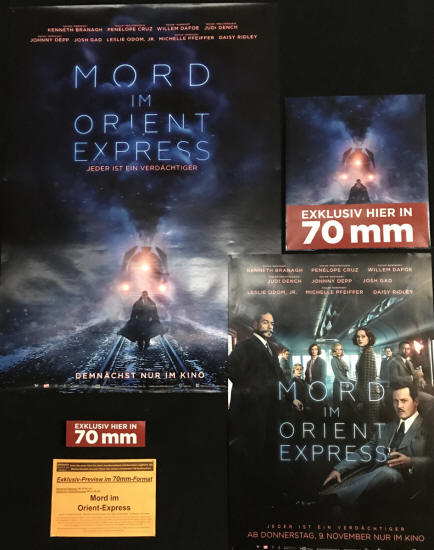 Poster
decoration at the Schauburg in Karlsruhe. Picture: Herbert Born Poster
decoration at the Schauburg in Karlsruhe. Picture: Herbert BornCREATING THE COSTUMES Branagh has worked with Costume Designer Alexandra Byrne for over thirty years in theatre, and in film, and as he explains: "Her hallmark is attention to detail, and research, research, research, so it's months, actually, once Alexandra is engaged, before you hear from her. She doesn't have a conversation with you, unless she can fill a room with costume references and possibilities. Often, it's a process of going through what doesn't work in order to suggest what does." Byrne completed an enormous amount of research, read the novel, watched previous incarnations of the story and cross-referenced them all with her reading of the script. She also created mood boards and explains: "They're not always historical, just totally eclectic images of something that I feel has to do with character, or a story point, or a moment of emotion within the film. I collected loads of images and then distilled them down to boards, and in doing that, you're editing your ideas. They are great, because they are a visual medium from which you can have a dialogue with Ken and the actors to create the look of the character." "The costumes are almost like a detective novel,” says Byrne. “In that very few characters are dressed as themselves. We needed to understand the background of each character, to know how they would have made the decisions to dress the way they do, as somebody else, and what resources they would have had to put that together. You have to have a set of rules from which to make sound decisions, so we did a lot of research, and I've enjoyed the fact that you don't want to give too much away with the clothes, but, equally, it has to have an integrity and truth to it." Willem Dafoe (Gerhard Hardman) also relied on Alex Byrne's expertise to help him with his character's costume. He explains: "Something that I didn't know is there's a very different kind of tailoring style for Americans and Europeans, and even among Europeans, there's a difference between Northern Europeans and Mediterraneans, so of course, since my character is trying to pass as an Austrian, even though he is really an American, there were discussions to be had as to how noticeable to make that through the costume." He continues: "You're always walking a line between finding something very distinctive, but not so showy that it sticks out or calls attention to itself. In a film like this, the look becomes a huge key to the character." Byrne was delighted with the period as it was still possible to find original fabric that could be copied and gave added veracity to the look. She explains: "We can still find a precious half-meter of original 1930’s fabric - when you pull it, it's rotten and falls apart, but it gives you information about what kind of weight and what color fabric you're looking for... we also bought a lot of old fabric sample books, which have been closed, so they haven't faded in the sun, and that's a great reference for what you're trying to achieve." |
|
But surely for everything you love you have to
pay some price.
|
|
|
"Agatha Christie knows how to tell a story
with complete, compelling, page-turning intensity, concludes Branagh.
“If you like a real mystery, it's a gripping yarn. It happens in this case
to be peopled by a lot of terrific actors who, I think, intensify that
mystery. It's unsettling. It's entertaining. It's surprising. And, if you
like a murder mystery with heart and passion and soul, I think it's worth a
look." MURDER ON THE ORIENT EXPRESS was filmed over thirteen weeks at Longcross Studios near London and on location in Malta from November 2016 to March 2017. |
|
BACKGROUND |
|
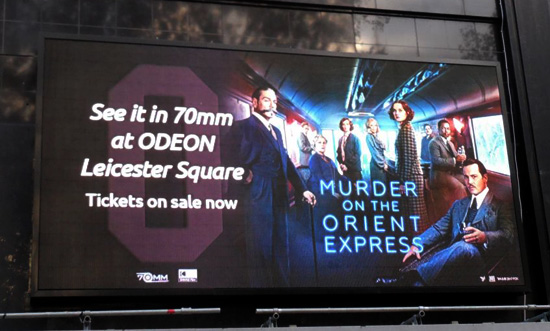 Odeon
Leicester Sq, London. Picture by Howard B Haas Odeon
Leicester Sq, London. Picture by Howard B HaasAgatha Christie • Her prolific writing career spanned five decades, with 66 crime novels, 6 non-crime novels and 150 short stories • She wrote over 20 plays, of which the most famous, 'The Mousetrap', is the longest running play in the world, having debuted in 1952 • With more than 2 billion books published, she is outsold only by the Bible and Shakespeare • Easily translatable, her books have been published in over 100 languages, making her the most translated writer of all time. Agatha Mary Clarissa Miller was born on 15 September 1890 in Torquay, in the south west of England, to an English mother and an American father. She taught herself to read at five years old, and began writing her own poems from a young age. Her education was a combination of informal tutoring at home (mainly by her parents) and teaching establishments in Paris, where she became an accomplished opera singer and pianist. By the age of 18 she was amusing herself with writing short stories, some of which were published in much revised form in the 1930s. In 1914 Christie became a nurse in the Voluntary Aid Detachment of the Red Cross Hospital in Torquay, and when the hospital opened a dispensary, she accepted an offer to work there and completed the examination of the Society of Apothecaries. This sparked a lifelong interest in the use of poisons, which made a huge contribution to her first novel The Mysterious Affair at Styles. The murderer’s use of poison was so well described that Christie received an unprecedented honor for a writer of fiction, a review in the Pharmaceutical Journal. She was spurred on to write a detective story following a challenge from her elder sister Madge. As there were Belgian refugees in most parts of the English countryside, Torquay being no exception, Christie thought that a Belgian refugee, perhaps a former great Belgian policeman, would make an excellent detective for her first novel. Hercule Poirot was born. In 1919, Christie gave birth to her first child with husband Archie, a daughter, Rosalind. This was also the year that publisher John Lane contracted her to produce five more books. She went on to be one of the first authors Penguin ever published in paperback. Following the war Christie continued to write and to travel with Archie, including a Grand Tour of the Empire in 1922 during which she learned to surf in South Africa and Hawaii (in fact she became the first British woman to surf). They divorced in 1928, and Christie then fulfilled one of her lifelong ambitions - to travel on the Orient Express to the Middle East. This and future trips are recognized in books such as Murder on the Orient Express, Death on the Nile, Murder in Mesopotamia, Appointment with Death and They Came to Baghdad, as well as many short stories. 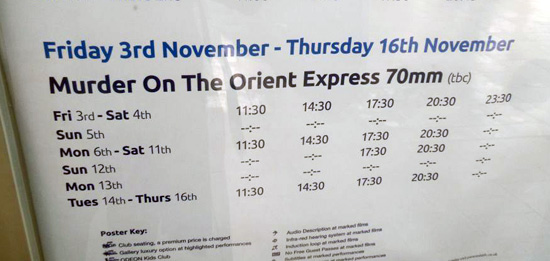 Odeon
Leicester Sq, London. Picture by Howard B Haas Odeon
Leicester Sq, London. Picture by Howard B HaasDuring a trip to the excavations at Ur in 1930, Christie met archaeologist Max Mallowan - the man who became her second husband, and who was fourteen years her Jr.. Their marriage would last forty-six years. She accompanied Max on his annual archaeological expeditions for nearly 30 years. The excursions did nothing to stem the flow of her writing and her book, Come, Tell Me How You Live, published in 1946, wittily describes her early days on digs in Syria with Max. By 1930, having written several novels and short stories, she had created a new character to act as detective. Miss Jane Marple was an amalgam of several old ladies she used to meet in villages she visited as a child. When she created Miss Marple, Christie did not expect her to become Poirot’s rival, but with The Murder at the Vicarage, Miss Marple’s first outing, it appeared she had produced another popular and enduring character. In 1971 Christie achieved one of Britain’s highest honors when she was made a Dame of the British Empire. Her last public appearance was at the opening night of the 1974 film version of 'Murder on the Orient Express' starring Albert Finney as Hercule Poirot. Her verdict? A good adaptation with the minor point that Poirot's moustaches weren't luxurious enough. Christie died peacefully on 12 January 1976. She is buried in the churchyard of St Mary's, Cholsey, near Wallingford. More Information |
|
Some World Events in 1934 |
|
 70mm
print arrived 02.11.2017 at the Schauburg Cinerama, Kalrsruhe, Germany.
Picture: Herbert Born 70mm
print arrived 02.11.2017 at the Schauburg Cinerama, Kalrsruhe, Germany.
Picture: Herbert Born· The rise of Adolf Hitler, which was reinforced when President Hindenburg died and Hitler became head of state as well as chancellor, calling himself the Führer · In Italy, all elementary school teachers had to wear the black shirt of the fascist party when they were in school · The League of Nations admitted the Soviet Union · Josef Stalin solidified his control of the Soviet Union as he started his Great Purge · Japan renounced its naval treaties with the US and UK in an attempt to grow its navy · In Turkey, women were given the right to vote in parliamentary elections · In the US, Congress approved the Lindbergh Act, which made kidnapping a capital offence · Bruno Hauptmann was arrested and charged with the kidnap and murder of baby Charles Lindbergh Jr. · The US Government opened a maximum security prison on Alcatraz Island in San Francisco · The FBI killed John Dillinger in Chicago as he left a cinema · Bonnie and Clyde were shot to death in a police ambush · Fox Film's "Cavalcade" won Best Picture at the sixth Academy Awards · The Flying Scotsman became the first steam locomotive to be officially recorded at 100 mph |
|
CAST BIOS |
|
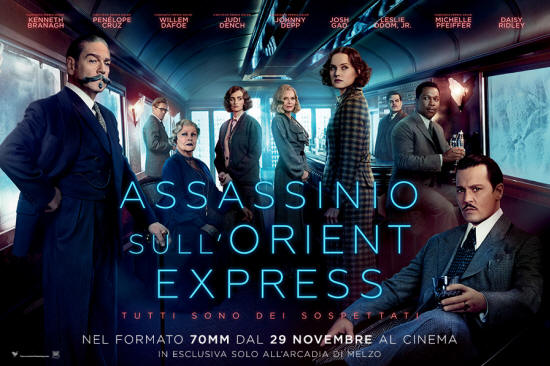 Kenneth Branagh - Hercule Poirot/Director/Producer Kenneth Branagh - Hercule Poirot/Director/ProducerKenneth Branagh is an acclaimed actor and director whose work across film, television and theatre is underscored by quality, truth and passion. He has been nominated for five Academy Awards®, making him one of the first actors to receive five nominations in five separate categories (Actor, Supporting Actor, Director, Screenplay, and Short Film). Branagh has directed 20th Century Fox’s adaptation of Agatha Christie’s classic mystery, MURDER ON THE ORIENT EXPRESS. In addition to being behind the camera, Branagh will also star as ‘Hercule Poirot’ opposite an all-star cast, including Johnny Depp, Penelope Cruz, Michelle Pfeiffer and Dame Judi Dench. The film is slated to be released in November. Currently, Branagh is in pre-production on Disney’s adaptation of the best-selling children’s series, ARTEMIS FOWL, which follows a young Irish criminal mastermind on a mission to rescue his father. In March 2015, Branagh directed the live-action CINDERELLA for Disney. The critically acclaimed film, which starred Cate Blanchett, Lily James, Richard Madden and Helena Bonham Carter, grossed over $540 million at the global box office. In May 2011, Branagh directed Marvel’s action adventure, THOR, starring Chris Hemsworth, Natalie Portman, and Sir Anthony Hopkins. The film grossed over $448 million worldwide. Branagh's first venture into filmmaking met instant success. His 1989 production of HENRY V, which he starred in and directed, won a score of international awards including Academy Award® nominations for Best Actor and Best Director. His previous directing credits include, DEAD AGAIN, PETER’S FRIENDS, MUCH ADO ABOUT NOTHING, SWAN SONG, which received an Academy Award® nomination, MARY SHELLEY’S FRANKENSTEIN, HAMLET, which received 4 Academy Award® nominations, LOVE’S LABOUR’S LOST, AS YOU LIKE IT, THE MAGIC FLUTE, and SLEUTH. In addition to his work behind the camera, Branagh is also a gifted and well-respected actor. This year, he starred in Christopher Nolan’s critically acclaimed box office hit, DUNKIRK. Branagh portrayed ‘Commander Bolton’, a British officer who seeks to evacuate allied soldiers from Belgium, the British Empire, and France surrounded by the German Army during World War II. In 2011, Branagh starred as ‘Sir Laurence Olivier’ in Simon Curtis’ MY WEEK WITH MARILYN opposite Michelle Williams. The role earned Branagh an Academy Award® nomination for Best Supporting Actor, as well as a Golden Globe and Screen Actors Guild nomination. His additional acting credits include, A MONTH IN THE COUNTRY, OTHELLO, THE GINERBREAD MAN, Woody Allen’s CELEBRITY, ALIEN LOVE TRIANGLE, Paul Greengrass's THE THEORY OF FLIGHT, WILD WILD WEST, Philip Noyce's RABBIT PROOF FENCE, HARRY POTTER AND THE CHAMBER OF SECRETS, PIRATE RADIO, and VALKYRIE. His work on the small screen includes an Emmy® and Golden Globe® nominated performance in the BAFTA award winning series WALLANDER. He has also starred in SHACKLETON, CONSPIRACY for which he won an Emmy® for Best Actor and earned a Golden Globe® nomination; WARM SPRINGS in which he played FDR and was nominated for an Emmy®, Golden Globe® and a SAG Award. In addition to his successful career in film and television, Branagh is a distinguished director and actors on the stage. This fall Branagh directed a new production of HAMLET, starring Tom Hiddleston, as a fund-raising venture for the Royal Academy of Dramatic Art, where Branagh is President. Last year, The Kenneth Branagh Theatre Company completed its highly regarded and successful inaugural season of Plays at the Garrick Theatre in London’s West End. The productions included THE WINTER’S TALE, HARLEQUINADE, ALL ON HER OWN, THE PAINKILLER, RED VELVET, ROMEO AND JULIET and THE ENTERTAINER. The work earned the company a prestigious Olivier Award. Branagh’s stage work began when he made his West End acting debut in ANOTHER COUNTRY, which earned him the Olivier Award for "Most Promising Newcomer." He founded the Renaissance Theatre Company for whom he either starred in or directed TWELFTH NIGHT, MUCH ADO ABOUT NOTHING, AS YOU LIKE IT, HAMLET, LOOK BACK IN ANGER, UNCLE VANYA, KING LEAR, A MIDSUMMER NIGHT'S DREAM, CORIOLANUS and THE LIFE OF NAPOLEON. He also wrote the plays PUBLIC ENEMY and TELL ME HONESTLY. Numerous stage appearances include HENRY V, LOVE'S LABOUR'S LOST, and HAMLET for the Royal Shakespeare Company. His other theatrical endeavors include directing the hit stage comedy THE PLAY WHAT I WROTE which transferred from London's West End to Broadway where it received a TONY nomination, and five-star performances on the British stage in RICHARD III, Mamet's EDMOND, IVANOV, and the new comedy PAINKILLER in the opening season at the Lyric Theatre, Belfast, Branagh’s hometown. Branagh is a graduate of the Royal Academy of Dramatic Art where he won the Bancroft Gold Medal. He received the prestigious Michael Balcon Award from the British Academy of Film and Television Arts (BAFTA), for outstanding contribution to cinema. He was also knighted for services to drama and the community in Northern Ireland by Queen Elizabeth II and will receive the freedom of Belfast from its City Council later this year.  Zoo
Palast, Berlin, Germany. Image by Gerhard Witte. Zoo
Palast, Berlin, Germany. Image by Gerhard Witte.Michelle Pfeiffer - Caroline Hubbard Golden Globe Award winner, Emmy nominee and three-time Academy Award nominee Michelle Pfeiffer has captivated film audiences with her stunning beauty and compelling performances for over three decades. Pfeiffer was seen this spring in HBO’s drama “The Wizard of Lies” alongside Robert De Niro for which she garnered an Emmy nomination. The duo play Ruth and Bernie Madoff in the 2008-2009 downfall of Madoff’s infamous Ponzi scheme. The television drama is based on the non-fiction novel by the same name written by Diana B. Henriques. Pfeiffer can currently be seen starring alongside Ed Harris, Jennifer Lawrence and Javier Bardem in Darren Aronofsky’s new drama “Mother!” The film was released by Paramount Pictures in October. Pfeiffer will be seen this fall in 20th Century Fox’s upcoming adaptation of “Murder on the Orient Express” alongside Johnny Depp, Judi Dench and Daisy Ridley. Kenneth Branagh is both directing and starring in the remake playing Agatha Christie’s famed detective Hercule Poirot. Adapted from Christie’s beloved 1934 novel, the film follows Poirot as he tries to identify a murder aboard the legendary train. Pfeiffer will play Mrs. Hubbard, a glamorous and opinionated passenger with a secret. The film opens on Thanksgiving Day, Wednesday, November 22nd. Pfeiffer received her first Academy Award nomination in 1989 in the ‘Best Actress in a Supporting Role’ category for her role as the long-suffering ‘Madame de Tourvel’ in “Dangerous Liaisons.” In 1990, she won a Golden Globe Award for ‘Best Performance by an Actress in a Motion Picture’ and received her second Academy Award nomination in ‘Best Actress in a Leading Role’ for her performance as the sexy chanteuse ‘Suzie Diamond’ in “The Fabulous Baker Boys.” She earned her third Academy Award nomination in 1993 for ‘Best Actress in a Leading Role’ for her performance as Dallas housewife ‘Lurene Hallett’ in “Love Field.” Pfeiffer has also been honored with a BAFTA Award, Los Angeles Film Critics Association Award, National Board of Review Best Actress Award and New York Film Critics Circle Award, and has also received a Screen Actors Guild Award nomination and five additional Golden Globe Award nominations for her performances in “The Age of Innocence,” “Love Field,” “Frankie and Johnny,” “The Russia House,” and “Married to the Mob.” The celebrated actress first came to prominence in the cult classic “Scarface” in 1983 in the role of ‘Elvira Hancock,’ the wife of Al Pacino’s ‘Tony Montana.’ The Universal Pictures American crime drama, directed by Brian De Palma and written by Oliver Stone, has become a cultural icon, and was named by the American Film Institute in June 2008 as one of the ten greatest gangster films of all time. In 2013, Pfeiffer starred alongside Robert De Niro, Tommy Lee Jones and Dianna Agron in Luc Besson’s 2013 film, “The Family.” The story focuses on the Manzoni family, a notorious mafia clan who is relocated to Normandy, France under the Witness Protections Program. Pfeiffer stars as Maggie Blake, the matriarch of the family. Pfeiffer was seen in “Dark Shadows,” a film that reunites her with Tim Burton on his big-screen take on the 1960s gothic vampire television series. The film centers on a self-loathing vampire, ‘Barnabas Collins,’ played by Johnny Depp, who is living in a manor in Collinsport, Maine, and is searching for his lost love. Pfeiffer stars as ‘Elizabeth Collins Stoddard,’ the reclusive matriarch of the Collins family which runs the Maine town. The film also stars Helena Bonham Carter and Eva Green. Additionally, Pfeiffer was seen in DreamWorks Pictures’ “People Like Us,” in which she stars opposite Chris Pine, Olivia Wilde and Elizabeth Banks. The film follows a businessman, ‘Sam’ (Pine), who returns home after his estranged father’s sudden death, only to uncover a devastating family secret, which sends him on an unexpected journey of self-discovery. Pfeiffer appears as ‘Lillian,’ ‘Sam’s’ widowed mother. In 2011, Pfeiffer was seen in New Line Cinema’s “New Year’s Eve.” Directed by Garry Marshall, the ensemble romantic comedy also stars Robert De Niro, Hilary Swank, Sarah Jessica Parker and Ashton Kutcher, among others. The film tells intertwining stories of a group of New Yorkers as they navigate their way through romance over the course of New Year’s Eve. Pfeiffer appears as ‘Ingrid,’ a frustrated executive secretary who decides to tackle her unfulfilled resolutions. In 2009, Pfeiffer starred in Miramax Films’ “Chéri.” Set in the luxurious 1900s Belle Époque Paris, “Chéri” is the story of a love affair between a beautiful retired courtesan, ‘Léa de Lonval’ (Pfeiffer), and ‘Chéri,’ a young man played by Rupert Friend. The film is directed by Stephen Frears and is based on the 1920 novel of the same name by French author Colette. In 2007, Pfeiffer also appeared in the Golden Globe nominated global sensation “Hairspray” opposite John Travolta, Christopher Walken, Queen Latifah and Zac Efron. The New Line Cinema film, an adaptation of Broadway’s 2003 Tony Award winner for ‘Best Musical,’ became the third musical film in history to cross $200 million internationally. That same year, Pfeiffer also appeared as evil witch ‘Lamia’ in Paramount Pictures’ fantasy epic “Stardust,” directed by Matthew Vaughn. The film, a fairy tale set in ancient England, was adapted from Neil Gaiman’s novel. The cast included Claire Danes, Robert De Niro, Ian McKellen, Rupert Everett and Sienna Miller. In 2003, Pfeiffer lent her voice to DreamWorks’ animated feature “Sinbad: Legend of the Seven Seas” with Brad Pitt, Catherine Zeta-Jones and Joseph Fiennes. She received a Screen Actors Guild nomination in 2002 for her role as the murderous mother ‘Ingrid Magnusson’ in Warner Brothers’ “White Oleander.” In 2001, she starred in the critically acclaimed “I Am Sam,” opposite Sean Penn. In 2000, she starred in the summer blockbuster “What Lies Beneath,” opposite Harrison Ford. Pfeiffer’s film credits also include “The Story of Us,” “A Midsummer Night’s Dream,” “The Deep End of the Ocean,” “The Prince of Egypt,” “One Fine Day,” “To Gillian on Her 37th Birthday,” “Up Close & Personal,” “Dangerous Minds,” “Wolf,” “Batman Returns,” “The Witches of Eastwick,” “Tequila Sunrise,” Sweet Liberty” and “Ladyhawke.” 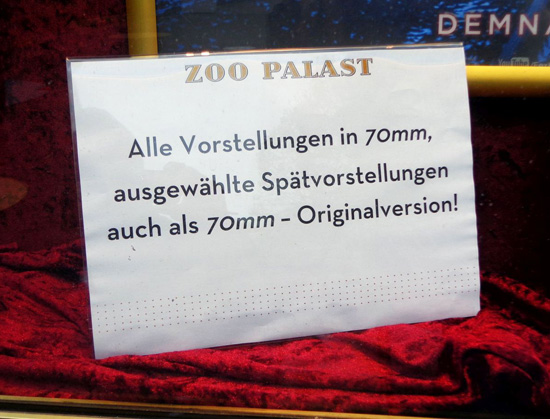 Zoo
Palast, Berlin, Germany. Image by Gerhard Witte. Zoo
Palast, Berlin, Germany. Image by Gerhard Witte.Dame Judi Dench - Princess Natalia Dragomiroff Since playing Ophelia in 'Hamlet' at The Old Vic Theatre almost 60 years ago, Judi Dench has garnered wide popular and critical admiration for a career marked by outstanding performances in both classical and contemporary roles. She has won numerous major awards – including an Academy Award, ten BAFTA Awards and a record eight Laurence Olivier Awards – for work on both stage and screen, and in recognition of her many achievements she received an OBE (Order of the British Empire) in 1970, became a DBE (Dame of the British Empire) in 1988, and in 2005 was awarded a Companion of Honour. She has also received the Japan Arts Association’s prestigious Praemium Imperiale Laureate Award for Film and Theatre. Dame Judi can currently be seen in 'Victoria & Abdul', directed by Stephen Frears for Working Title and BBC Films, in which she plays Queen Victoria on screen for the second time in her career. For her first such performance, directed by John Madden in 'Mrs. Brown', she won BAFTA and Golden Globe awards and was nominated for an Academy Award. Dame Judi received an Academy Award and a BAFTA Award, both for Best Supporting Actress, for another magisterial performance as Queen Elizabeth I in 'Shakespeare In Love', and she has received Academy Award nominations for performances in a further five films: Lasse Hallstrom’s 'Chocolat', for which she was also nominated for a Golden Globe; 'Iris', directed by Richard Eyre, for which she also won a BAFTA Award; 'Mrs Henderson Presents', directed by Stephen Frears, for which she was further nominated at the BAFTAs and the Golden Globes; 'Notes on a Scandal', again directed by Richard Eyre, which also brought her BAFTA and Golden Globe nominations; and 'Philomena', directed by Stephen Frears and co-starring Steve Coogan, for which she also received BAFTA, Golden Globe and SAG award nominations. Dame Judi is recognised globally for her legendary role as M in seven James Bond films, from 'Goldeneye' to 'Skyfall'. Her other film work includes 'Tea With Mussolini', directed by Franco Zeffirelli; 'A Room With a View' and 'A Handful of Dust', both of which brought her BAFTA Awards for Best Supporting Actress; '84 Charing Cross Road', directed by David Jones; 'Henry V' and 'Hamlet', both directed Kenneth Branagh; 'Nine', directed by Rob Marshall; 'Jane Eyre', directed by Cary Fukunaga; 'My Week with Marilyn', directed by Simon Curtis; 'J. Edgar', directed by Clint Eastwood; the hugely successful India-set comedy 'The Best Exotic Marigold Hotel', and its sequel 'The Second Best Exotic Marigold Hotel', both directed by John Madden; Roald Dahl’s 'Esio Trot', opposite Dustin Hoffman; 'Miss Peregrine’s Home for Peculiar Children', directed by Tim Burton; and the upcoming 'Tulip Fever', written by Deborah Moggach and Tom Stoppard and directed by Justin Chadwick. Dame Judi is also revered for her television work. Most recently she starred as Cecily, Duchess of York, in 'The Hollow Crown' for the BBC, and past credits include: 'The Last of the Blonde Bombshells', for which she received BAFTA and Golden Globe Awards and an Emmy Award nomination; the long-running hit BBC sitcom 'As Time Goes By'; and the critically acclaimed 'Cranford' and 'Cranford: Return to Cranford', for which she received a number of major award nominations. Dame Judi’s achievements on screen are mirrored by her celebrated career on stage. She received an Olivier Award for Best Supporting Actress for her most recent role as Paulina in Kenneth Branagh’s celebrated West End production of 'The Winter’s Tale', and she has previously won Olivier Awards for 'Macbeth' and 'Juno and the Paycock' for the RSC; 'Pack of Lies' at the London Lyric; and 'Anthony and Cleopatra', 'Absolute Hell', and 'A Little Night Music', all at The National Theatre. Her performance in David Hare’s 'Amy’s View', directed by Richard Eyre, brought her a Critics Circle Award and an Olivier Award nomination when it played in London at The National and Aldwych, followed by a Tony Award for Best Actress when the play transferred to Broadway. Her other theatre credits include: 'The Royal Family', directed by Peter Hall; 'The Breath of Life', directed by Howard Davies and co-starring Dame Maggie Smith; 'All’s Well That Ends Well, for 'the RSC; 'Hay Fever', directed by Peter Hall; 'The Merry Wives of Windsor', for the RSC; 'Madame de Sade', directed by Michael Grandage for The Donmar West End; Peter Hall’s production of 'A Midsummer Night’s Dream' at the Rose Theatre, Kingston; 'Peter and Alice', directed by Michael Grandage in the West End; and 'The Vote', directed by Josie Rourke for The Donmar in 2015, which was also broadcast live on UK General Election night in a landmark television event. 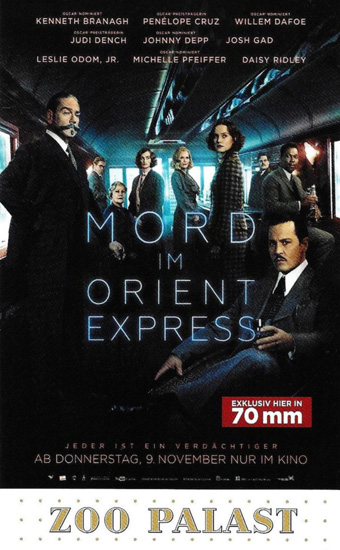 Zoo
Palast, Berlin, Germany. Image by Gerhard Witte. Zoo
Palast, Berlin, Germany. Image by Gerhard Witte.Johnny Depp - Edward Ratchett Johnny Depp is an award-winning actor who is also producing projects under the banner of his company, infinitum nihil. A three-time Academy Award nominee in the category of Best Actor, Depp was honored with his first Oscar nod for his work in Gore Verbinski’s 2003 blockbuster 'Pirates of the Caribbean: The Curse of the Black Pearl', which launched the hugely successful film franchise. He also won a Screen Actors Guild (SAG) Award and an Empire Award and garnered Golden Globe and BAFTA Award nominations for his creation of Captain Jack Sparrow, who became an instant screen classic. Depp went on to reprise the role in 'Pirates of the Caribbean: Dead Man’s Chest', earning another Golden Globe nomination; 'Pirates of the Caribbean: At World’s End', and 'Pirates of the Caribbean: On Stranger Tides'. He recently starred in 'Pirates of the Caribbean: Dead Men Tell No Tales'. His next Oscar nomination came for his performance in Marc Forster’s acclaimed 2004 drama 'Finding Neverland'. For his portrayal of Peter Pan author James Barrie in that film, he also received Golden Globe, BAFTA Award and SAG Award nominations. He earned his third Oscar nomination for his work in 'Sweeney Todd: The Demon Barber of Fleet Street', director Tim Burton’s 2007 screen adaptation of the Stephen Sondheim musical. Depp also won a Golden Globe for Best Actor in a Motion Picture – Comedy or Musical for his performance in the film’s title role. He has collaborated with Burton on eight features to date, starting with the title role in 'Edward Scissorhands', for which he received a Golden Globe nomination. He also earned Golden Globe nominations for his work under Burton’s direction in 'Ed Wood', winning a London Film Critics Circle Award for the title role; 'Charlie and the Chocolate Factory', as Willy Wonka; and 'Alice in Wonderland', playing the Mad Hatter. Additionally, he starred in 'Dark Shadows' and lent his voice to Burton’s animated hit 'Corpse Bride'. Depp recently gained critical acclaim in Scott Cooper’s 'Black Mass' as Boston’s notorious crime boss James 'Whitey' Bulger. The leading role earned him a Screen Actors Guild (SAG) nomination and Critic’s Choice nomination for Best Actor. Depp began his performing career as a musician, before segueing to acting. He made his feature film debut in the horror hit 'A Nightmare on Elm Street', followed by Oliver Stone’s Oscar®-winning war drama 'Platoon'. In 1987, he landed his breakout role on the hit television show '21 Jump Street'. After starring in the series for four seasons, Depp returned to the big screen in John Waters’ 'Cry-Baby'. His early film work also includes 'Benny & Joon', gaining a Golden Globe nomination; Lasse Hallström’s 'What’s Eating Gilbert Grape'; 'Don Juan DeMarco', with Marlon Brando; Mike Newell’s 'Donnie Brasco'; and Terry Gilliam’s 'Fear and Loathing in Las Vegas'. In 1997, Depp made his writing and directing debut with 'The Brave', in which he also starred with Brando. Depp has also starred in such diverse films as Lasse Hallström’s 'Chocolat', for which he was nominated for a Golden Globe; the Hughes brothers’ 'From Hell'; Robert Rodriguez’s 'Once Upon a Time in Mexico'; Michael Mann’s 'Public Enemies'; 'The Tourist', earning another Golden Globe nomination; 'The Rum Diary', which he also produced; Verbinski’s 'The Lone Ranger'; Rob Marshall’s screen adaptation of the hit musical 'Into the Woods', and recently reprised the role of the Mad Hatter in the adventure 'Alice: Through the Looking Glass'. In addition, he voiced the title character in Verbinski’s Oscar-winning animated feature 'Rango', and was a producer on Martin Scorsese’s Oscar-nominated fantasy 'Hugo'. He next stars in the crime thriller, 'Labyrinth', for Open Road, as a detective who investigates the Tupac Shakur and Notorious B.I.G. murders, as well as IM Global’s ‘Richard Says Goodbye’. He is currently filming J.K. Rowling’s ‘Fantastic Beasts and Where to Find Them 2,’ directed by David Yates. 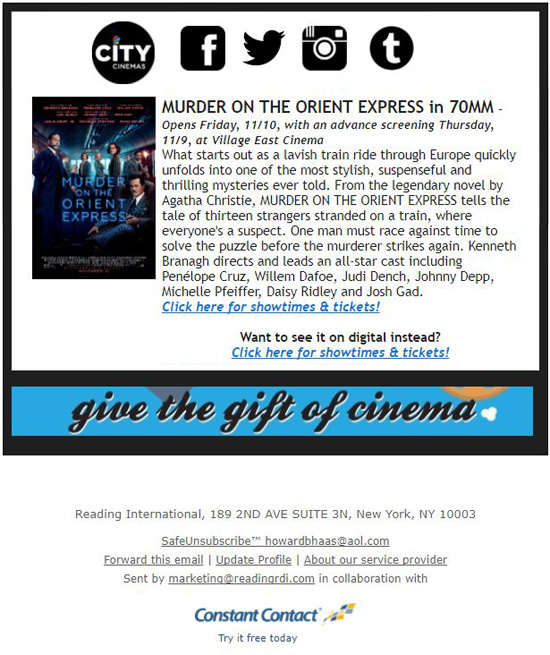 City
Cinema, New York City
Cinema, New YorkDerek Jacobi - Edward Henry Masterman On film, Jacobi recently collaborated with Director Kenneth Branagh, playing King in 'Cinderella'. He has previously worked with Branagh on 'Hamlet' in which he played Claudius, as Franklyn Madson in 'Dead Again' and as the Chorus in 'Henry V'. Other recent film credits include Simon West's 'Stratton', Radu Mihaileanu's 'The History of Love' and Clint Eastwood's 'Heareafter'. His very numerous and award-winning other film credits include Tom Hooper's 'The King's Speech', Robert Altman's 'Gosford Park', Ridley Scott's 'Gladiator', John Maybury's 'Love is the Devil' and Christine Edzard's 'Little Dorrit'. Best known for his stage work, Jacobi was a founder member of the Royal National Theatre and most recently collaborated with Director Kenneth Branagh on his Garrick Theatre production of 'Romeo and Juliet' in which he played Mercutio. A long time collaborator with Michael Grandage, Jacobi has appeared in the title role in 'King Lear', as Malvolio in 'Twelfth Night' for which he won an Olivier Award, 'Don Carlos' and 'The Tempest'. Other theatre performances include Thea Sharrock's 'A Voyage Round My Father', John Barton's 'The Hollow Crown', the title role in Adrian Noble's 'Macbeth', Sam Mendes' 'Kean', the title roles in Clifford Williams' productions of 'Richard II', 'Richard III' and as Alan Turing in 'Breaking the Code' for which he was Tony Award nominated. For his work on Terry Hands' 'Much Ado About Nothing' and 'Cyrano de Bergerac', Jacobi won London Critics Circle Theatre Awards for Best Actor, in addition to a Tony for his role as Benedick in the former. Jacobi was directed by Laurence Olivier in a National Theatre/Old Vic Theatre production of 'Hamlet' and by Noel Coward in a production of 'Hay Fever'. On television, Jacobi is possibly best known for playing the title role in the BBC production of 'I, Claudius'. More recent television appearances include ITV's Vicious' with Ian McKellan, the BBC's 'Last Tango in Halifax' and 'Last Tango in Halifax 2 & 3', Ciaran Donnelly's 'Titanic' and Neil Jordan's 'The Borgias' for Showtime'. Further television credits include 'Miss Marple: Murder at the Vicarage', 'The Gathering Storm' and as the title character in 'Cadfael'. Jacobi has also recently provided narration for the children's television series 'In the Night Garden'. Educated at St. John's College, Cambridge, Sir Derek Jacobi was knighted in 1983 for services to the theatre and was honoured as a Knight First Class of the Order of the Danneborg (Danish knighthood) in 1989. Josh Gad - Hector MacQueen JOSH GAD brings incredible wit, humor and depth to all of his roles from a Summer-loving snowman to a wacky Mormon missionary. Gad recently starred in the live-action Disney film 'Beauty and the Beast' in the role of Le Fou, Gaston’s side-kick. He recently wrapped production on Open Road Film’s 'Marshall', about Supreme Court Justice Thurgood Marshall. He was most recently found lending his voice in Sony’s 'The Angry Birds Movie', an animated film adaptation of the popular game. Gad’s upcoming projects include Paramount’s comedy, 'Heavy Duty', based on his original idea and STX’s 'Russ and Roger', where he will star alongside Will Ferrell and play the role of Roger Ebert. Last year, Gad starred alongside Billy Crystal in the FX show 'The Comedians' about a veteran comedian who is reluctantly paired with a younger, edgier comedian for a late-night comedy sketch show. Additional film credits include starring alongside Adam Sandler and Peter Dinklage in Sony’s 'Pixels', starring opposite Kevin Hart in 'The Wedding Ringer', Zach Braff’s indie project, 'Wish I Was Here', starring as the loveable sidekick ‘Olaf’ in Disney’s award-winning animated film, 'Frozen', the Steve Job’s biopic, 'Jobs;' 'Thanks for Sharing' with Gwyneth Paltrow, Mark Ruffalo and Tim Robbins; Shawn Levy’s 'The Internship', opposite Vince Vaughn and Owen Wilson; Ed Zwick’s 'Love & Other Drugs', with Jake Gyllenhaal, Anne Hathaway and Hank Azaria; Shawn Levy’s 'The Rocker', alongside Rainn Wilson; '21', opposite Kate Bosworth, Lawrence Fishburne and Kevin Spacey; and 'Crossing Over', with Harrison Ford, Sean Penn, Ray Liotta and Ashley Judd. Other voice credits include 'Ice Age: Continental Drift', alongside Ray Romano, Queen Latifah, Jennifer Lopez and John Leguizamo. In 2012 Gad served as an executive producer, co-creator and star on NBC’s family comedy '1600 Penn'. He played Skip Gilchrist, the clumsy eldest son of the President (Bill Pullman), whose sincere attempts to do the right thing often go awry. Gad has also lent his voice to ‘Woodie’ on MTV’s animated series 'Good Vibes' and played the title role on BBC Worldwide’s 'Gigi: Almost American'. He has guest-starred on hit series such as 'New Girl' and 'Modern Family'. Gad also took Broadway by storm starring as Elder Cunningham in the Tony Award-winning comedy musical 'Book of Mormon'. Gad was nominated for Tony, Drama League and Astaire awards, winning the Outer Critics Circle Award. He made his Broadway debut in a Tony-winning production of 'The 25th Annual Putnam County Spelling Bee'. After graduating from the Carnegie Mellon School of Drama, Gad began his career in the theater. He then turned his sights to comedy, co-founding his own company, The Lost Nomads Comedy Troupe. Penélope Cruz - Pilar Estravados Academy Award winner Penelope Cruz has proven herself to be one of the most versatile actresses by playing a variety of compelling characters, and becoming the first actress from Spain to be nominated for and win an Academy Award. First introduced to American audiences in the Spanish films ‘Jamon, Jamon’ and ‘Belle Epoque,’ in 1998 she starred in her first English language film, ‘Hi-Lo Country’ for director Stephen Frears opposite Woody Harrelson, Patricia Arquette and Billy Crudup. In 1999, Cruz won the Best Actress award at the 13th Annual Goya Awards given by the Spanish Academy of Motion Pictures Arts and Sciences for her role in Fernando Trueba’s ‘The Girl of Your Dreams.’ Confirming her status as Spain’s hottest international actress, Cruz landed a series of coveted roles. She appeared in Billy Bob Thornton’s ‘All the Pretty Horses,’ Fina Torres’s ‘Woman on Top, Alejandro Amenabar’s ‘Open Your Eyes,’ Maria Ripoll’s ‘Twice Upon a Yesterday,’ and Nick Hamm’s ‘Talk of Angels.’ Additionally, Cruz co-starred in Pedro Almovodar’s ‘Live Flesh’ and critically acclaimed ‘All About My Mother’ which was awarded the Golden Globe and Oscar for Best Foreign Film. Next up for Penelope was New Line’s ‘Blow’ for director Ted Demme and ‘Captain Corelli’s Mandolin’ opposite Nicolas Cage. After that, Penelope starred opposite Tom Cruise in the erotic thriller ‘Vanilla Sky’. She then tackled ‘Masked & Anonymous,’ ‘Fan Fan la Tulipe,’ which opened the 2003 Cannes Film Festival, and ‘Don’t Tempt Me.’ She received rave reviews for her eagerly awaited performance in ‘Don’t Move’ (Non ti Muovere) in which she was honored with a David Di Donatello Award (Italian Oscar) and European Film Award for Best Actress. To add to her already brilliant and diverse choice of film credits, she starred in films including ‘Gothika’; ‘Head in the Clouds’; ‘Noel’; and ‘Chromophobia’. Penelope also co-stared with Matthew McConaughey and William H. Macy as Dr. Eva Rojas in the action-packed film ‘Sahara.’ In 2006, Penelope starred in ‘Volver,’ which again teamed her with director and dear friend Pedro Almodovar. Critically acclaimed for her role as Raimunda, she won the ‘Best Actress’ awards at the European Film Awards, the Spanish Goya Awards, the Cannes Film Festival, and received both Golden Globe and Oscar nominations. Penelope went on to star in ‘Elegy’ opposite Sir Ben Kingsley and Woody Allen’s ‘Vicky Cristina Barcelona’ opposite Javier Bardem and Scarlett Johansson. Penelope won an Oscar, a BAFTA, an NYFCC, and an NBR Award for Best Supporting Actress for her performance in ‘Vicky Christina Barcelona,’ making 2008 a very great year. In 2009, Penelope and Pedro Almodóvar were back in action for the fourth time with ‘Broken Embraces’ which she again received critical acclaim for her portrayal of Lena. Also in 2009, Penelope teamed up with director Rob Marshall and co-starred alongside Nicole Kidman, Daniel Day Lewis and Marion Cotillard in the film version of the musical ‘Nine.’ Her standout portrayal of Carla garnered SAG, Golden Globe and Oscar nominations. Her third Oscar nomination made history as it marked only the third time in Oscar history where the winner of the Academy Award for Best Supporting Actress was nominated for Best Supporting Actress again in the following year. In 2011, Penelope starred opposite Johnny Depp in the international blockbuster hit ‘Pirates of the Caribbean: On Stranger Tides,’ the fourth installment of the movie series directed by Rob Marshall. In the summer of 2011 Penelope also filmed Woody Allen's ‘To Rome with Love’ which was released on June 22, 2012. The Rome-set film also stars Alec Baldwin, Roberto Benigni, Judy Davis, Jesse Eisenberg, Greta Gerwig and Ellen Page. Penelope starred in Ridley Scott’s 2013 thriller ‘The Counselor’ alongside Cameron Diaz, Michael Fassbender, Javier Bardem, and Brad Pitt. She went on to star in ‘Twice Born’ directed by Sergio Castellitto, with whom she previously starred in his critically acclaimed film ‘Don't Move’. In 2016 Penelope starred in ‘Zoolander 2,’ the long-awaited sequel to the 2001 comedy directed by and starring Ben Stiller, as well as Louis Leterrier’s ‘The Brothers Grimsby,’ alongside Sacha Baron Cohen, Ian McShane, Rebel Wilson and Isla Fisher. She went on to produce and star in ‘Ma Ma,’ directed by acclaimed Spanish director Julio Medem. The film premiered at the 2015 Toronto Film Festival and was released in May 2016. Fernando Trueba’s ‘The Queen of Spain’ was released in November 2016 and earned Penelope her 9th Spanish Goya Award nomination. Penelope most recently starred in ‘Loving Pablo’ opposite Peter Sarsgaard and Javier Bardem. Written and directed by Fernando Leon de Aranoa, the film follows a journalist who strikes up a romantic relationship with notorious drug lord Pablo Escobar. The film premiered at the 2017 Venice Film Festival, and was featured at the 2017 Toronto International Film Festival and 2017 San Sebastian International Film Festival. She will next star in 20th Century Fox’s ‘Murder on the Orient Express,’ with a strong ensemble cast including Johnny Depp, Michelle Pfeiffer, Daisy Ridley, Michael Pena, Judi Dench, and Josh Gad, as well as Kenneth Branagh who also directed. Based on the 1934 Agatha Christie novel, the mystery begins after an American businessman is murdered aboard the train and the investigator tries to solve the murder, finding out eventually that 13 people all had something to do with the murder victim. The film hits theaters November 10, 2017. This January, Penelope will portray Donatella Versace, the sister of murdered fashion designer Gianni Versace, in FX’s ‘Versace: American Crime Story,’ the third installment in the Emmy-winning anthology series from Ryan Murphy, Nina Jacobson and Brad Simpson. This marks Penelope’s US television debut. Manuel Garcia-Rulfo - Marquez Manuel Garcia-Rulfo was born in Guadalajara, Jalisco, Mexico. He grew up on a ranch with a large family, horses and his beloved German Shepherd Anya. His grandfather, a film aficionado, created little plays and movies that Manuel would star in with his many cousins. At the age of 12, he traveled to the United States to stay with an American family in Vermont for a year to immerse himself in speaking English. In high school, Manuel enrolled in a theatre program and that is when he knew he wanted to pursue acting as a career. He saved his money and moved to Los Angeles to study at the New York Film Academy and the Larry Moss Studio. Manuel then moved back to Mexico and landed his first film as the lead in 'La ultima y nos vamos', ('One for the Road') directed by Eva Lopez Sanchez, which gave him recognition in the Mexican film community and led to other films such as '180 Grados' and 'La Noche de las Flores'. 'Bless Me, Ultima', directed by Carl Franklin was Manuel’s first American film. While continuing to star in films and television in Mexico, he also appeared with Jennifer Aniston in 'Cake' and a major recurring role in the 'From Dusk Till Dawn' series from producer/director Robert Rodriquez. Manuel was most recently seen opposite Denzel Washington, Chris Pratt and Ethan Hawke in 'The Magnificent Seven'. Directed by Antoine Fuqua, the film was released by MGM and Sony worldwide grossing $160 million. Manuel’s growing up riding horses was a valuable skill playing the role of Vasquez, but he did have to train for the gun-slinging. In 2018, Manuel will be seen opposite Benicio Del Toro in ‘Soldado,’ the follow up to ‘Sicario,’ in Steve McQueen’s ‘Widows’ with Liam Neeson, Colin Farrell and Michelle Rodriguez, and in ‘Mary’ opposite Gary Oldman and Emily Mortimer. He resides in both Los Angeles and Guadalajara, on the ranch, and continues to study acting at The Actor’s Studio. Olivia Colman - Hildegarde Schmidt Olivia Colman is a multi-award winning actress. Her film credits include the 2011 BAFTA-winning ‘Tyrannosaur’ directed by Paddy Consodine, for which she won a World Cinema Special Jury Prize for breakout performance at Sundance, and Best Actress awards at the British International Film Awards and Evening Standard British Film Awards. In 2015 she starred in Dystopian romantic comedy 'The Lobster’, directed by Yorgos Lanthimos. The film was nominated for the Palme d’Or at Cannes and went on to win the Jury Prize. For her role, Colman won Best Supporting Actress at the 2015 British Independent Film Awards and was nominated in the Best Comedy Performance category at the Evening Standard British Film Awards. Next up she plays the leading role of Queen Anne in 'The Favourite', playing opposite Emma Stone and Rachel Weisz, and directed by Yorgos Lanthimos - due for release in 2018. Other film credits include 'London Road', directed by Rufus Norris and also starring Tom Hardy, 'The Iron Lady' in which she played Carol Thatcher opposite Meryl Streep; ‘Hyde Park On Hudson’; 'Locke'; 'Cuban Fury'; and 'Hot Fuzz’. Olivia won a Golden Globe in 2017 for her portrayal of Angela Burr in the BBC/AMC television adaptation of John Le Carré’s detective novel, 'The Night Manager’, and won Best Leading Actress in 2014 for her role as DS Ellie Miller in the hit ITV series ‘Broadchurch’ which ran for three series. In 2013, Colman was a double award winner at the Television BAFTAs, winning Female Performance in a Comedy Programme for her portrayal of Sally Owen in 'Twenty Twelve', as well as Supporting Actress for her role as Sue in 'Accused’. She was also nominated for Best Female Performance in a Comedy Drama at the 2015 BAFTAs for her role of Alex Smallbone in BBC Two’s clerical comedy ‘Rev’. Additional television credits include: 'Flowers' (Channel 4); ‘Fleabag’ (BBC/Amazon); ‘Accused’ (BBC); ’The Thirteenth Tale’ (BBC); ’Twenty Twelve’ (BBC); 'Mr. Sloane' (Sky Atlantic); 'The Secrets' (BBC); 'The Suspicions of Mr. Whicher II' (ITV1); 'Peep Show' (Channel 4); 'Exile' (BBC); and 'Greenwing' (Channel 4). On stage, Colman recently finished a run of Lucy Kirkwood’s ‘Mosquitoes’ at the National Theatre, directed by Rufus Norris. Other stage work includes Howard Davies's production of 'Hay Fever’ (Noel Coward) and 'England People Very Nice’ (National Theatre). Willem Dafoe - Gerhard Hardman In 1979, Willem Dafoe was given a small role in Michael Cimino's 'Heaven's Gate' from which he was fired. His first feature role came shortly after in Kathryn Bigelow's 'The Loveless'. From there, he has gone on to perform in over 100 films - in Hollywood ('John Carter', 'Spider-Man', 'The English Patient', 'Finding Nemo', 'Once Upon A Time In Mexico', 'Clear And Present Danger', 'White Sands', 'Mississippi Burning', 'Streets Of Fire', 'American Dreamz'), independent U.S. cinema ('Out of The Furnace', 'The Fault in Our Stars', 'Bad Country', 'John Wick', 'The Clearing', 'Animal Factory', 'The Boondock Saints', 'American Psycho'), and abroad (Yimou Zhang’s 'The Great Wall', Theo Angelopoulos’ 'The Dust Of Time', Yim Ho's 'Pavilion Of Women', Yurek Bogayevicz's 'Edges Of The Lord', Wim Wenders' 'Faraway, So Close', Nobuhiro Suwa's segment of 'Paris Je t'aime', Brian Gilbert's 'Tom & Viv', Christian Carion's 'Farewell', The Spierig Brothers’ 'Daybreakers', Daniel Nettheim's 'The Hunter', Anton Corbijn’s 'A Most Wanted Man' and the international box-office hit 'Mr. Bean's Holiday'). He selects projects based on the diversity of roles and opportunities to work with strong directors. He worked in the films of Wes Anderson ('The Life Aquatic', 'The Grand Budapest Hotel', and 'The Fantastic Mr. Fox'), Martin Scorsese ('The Aviator', 'The Last Temptation Of Christ'), Spike Lee ('Inside Man'), Julian Schnabel ('Miral', 'Basquiat'), Paul Schrader ('Auto Focus', 'Affliction', 'Light Sleeper', 'The Walker', 'Adam Resurrected', 'Dog Eat Dog'), David Cronenberg ('Existenz'), Abel Ferrara ('Pasolini', '4:44: The Last Day On Earth', 'Go Go Tales', 'New Rose Hotel'), David Lynch ('Wild At Heart'), William Friedkin ('To Live And Die In LA'), Werner Herzog ('My Son, My Son, What Have Ye Done'), Oliver Stone ('Born On The Fourth Of July', 'Platoon'), Tommy Wirkola ('What Happened to Monday?'), Giada Colagrande ('A Woman', 'Before It Had A Name', ‘Padre’), and Lars von Trier ('Antichrist', 'Manderlay', and 'Nymphomaniac I & II'). He was twice nominated for an Academy Award ('Platoon' and 'Shadow Of The Vampire') and once for a Golden Globe. Among other nominations and awards, he received an LA Film Critics Award and an Independent Spirit Award. Upcoming films include Sean Baker’s ‘The Florida Project,’ James Wan DC Comics ‘Aquaman,’ and Julian Schnabel’s ‘At Eternity’s Gate’ where he will pay Vincent Van Gogh. Dafoe is one of the founding members of The Wooster Group, the New York based experimental theatre collective. He created and performed in all of the group's work from 1977 thru 2005, both in the U.S. and internationally. Since then, he worked with Richard Foreman in Idiot Savant at The Public Theatre (NYC) and most recently two international productions with Robert Wilson: 'The Life & Death of Marina Abramovic' and 'The Old Woman' opposite Mikhail Baryshnikov. Daisy Ridley - Mary Debenham Daisy Ridley is an English actress best known for her breakthrough role as Rey in the 2015 film, 'Star Wars: The Force Awakens'. She will reprise her role as Rey in 'Star Wars: Episode VIII' set to be released by Disney on December 15, 2017. Since appearing in 'Star Wars VII', Ridley voiced the lead role of Taeko in the 25th Anniversary re-release of Studio Ghibli’s classic animated film, 'Only Yesterday', which opened earlier this year. She also serves as an Executive Producer on the documentary 'The Eagle Huntress' which premiered at the 2016 Sundance Film Festival. The film, about a teenage girl named Ashol-Pan living in the mountains of northwestern Mongolia who is a female eagle huntress, was picked up by Sony Pictures Classics and Celluloid Dreams following the festival. It was released on October 28, 2016 and was recently nominated for a Producers Guild Award in the Documentary Theatrical Motion Pictures category and was named a Top Five Documentary of 2016 by the National Board of Review. This year, she also sang the duet At the Ballet from 'A Chorus Line' with Anne Hathaway for Barbra Streisand’s Encore: Movie Partners Sing Broadway Album. Ridley has several films in the pipeline such as the supernatural drama 'Kolma'. The film, directed by Marielle Heller, will reunite her with her with J.J. Abrams who will produce. Daisy is the recipient of a 2016 Oscar Wilde Award. The non-profit US-Ireland Alliance created the event to recognize the contributions of the Irish in film. Leslie Odom Jr. - Dr. Arbuthnot Multifaceted performer Leslie Odom, Jr. has most recently been seen in the blockbuster Broadway musical 'Hamilton', for which he won the Tony Award for Best Leading Actor in a Musical for the role of Aaron Burr. He is a Grammy Award winner as a principal soloist on Hamilton’s Original Broadway Cast Recording, which won the 2015 award for Best Musical Theater Album. Odom, Jr. originated the role of Burr in a sold-out run at The Public Theater in 2015, earning a Drama Desk Award nomination for Outstanding Featured Actor in a Musical and a Lucille Lortel Award nomination for Outstanding Lead Actor in a Musical. Odom, Jr. made his Broadway debut at the age of 17 in 'Rent', before heading to Carnegie Mellon University’s prestigious School of Drama, where he graduated with honors. He is the recipient of a 2002 Princess Grace Award for Acting, which is dedicated to identifying emerging talent in theater, dance and film. Additional theatre credits include 'Leap of Faith' on Broadway, for which he won the 2012 Astaire Award for Outstanding Male Dancer on Broadway and was nominated for a Drama League Award; the 2014 musical 'Venice', which also played at The Public Theater; and the Encores! Off-Center production of 'Tick, Tick... Boom!' which was his first time working with 'Hamilton' creator Lin-Manuel Miranda. On the small screen, Odom, Jr. is best-known for his portrayal of Sam Strickland in the NBC musical series 'Smash', and his recurring role as Reverend Curtis Scott on 'Law & Order: SVU'. He’s also appeared in episodes of 'Gotham', 'Person of Interest', 'Grey’s Anatomy', 'House of Lies', 'Vanished' and 'CSI: Miami'. On the big screen he starred in the 2012 film 'Red Tails' opposite Terrence Howard, Cuba Gooding, Jr. and David Oyelowo. As a recording artist, his self-titled debut album rose to number one on the iTunes Jazz charts and was nominated for an NAACP Image Award for Outstanding Jazz Album. Odom, Jr. was raised in Philadelphia, and currently resides in Los Angeles. Lucy Boynton - Countess Elena Andrenyi Lucy Boynton is a rising talent whose affable poise and enigmatic performances are making an indelible mark across entertainment. Boynton will next be seen in Kenneth Branagh’s ‘Murder on the Orient Express’, starring Jonny Depp, Michelle Pfeiffer and Dame Judi Dench. Based on the novel of the same name by Agatha Christie, the film follows a lavish train ride through Europe as it quickly unfolds into a thrilling mystery that leaves thirteen strangers stranded on a train. Twentieth Century Fox will release the film November 10, 2017. Boynton is currently in production on Bryan Singer’s ‘Bohemian Rhapsody’ opposite Rami Malik. The biopic centers on Freddie Mercury, the lead singer of the iconic rock band Queen. Boynton portrays “Mary Austin,” a lifelong companion of Freddie (Malek). Fox is slated to release the film December 25, 2018. Boynton also stars in Gareth Evans’ upcoming period thriller ‘Apostle’ opposite Dan Stevens and Michael Sheen for Netflix. The film follows a man who travels to a remote island and attempts to rescue his sister after she is kidnapped by a religious cult. Boynton was mostly recently seen in Danny Strong’s J.D. Salinger biopic ‘Rebel In The Rye’ alongside Nicholas Hoult, Kevin Spacey and Sarah Paulson. The film is an adaptation of Kenneth Slawenski’s biography, ‘J.D. Salinger: A Life’ and follows the legendary and secretive author through his life and centers on the birth of his iconic novel ‘The Catcher In The Rye’. Also this year, Boynton was seen in Lisa Rubin’s Netflix series ‘Gypsy’ opposite Naomi Watts. The series follows “Jean Holloway” (Watts), a therapist who begins to develop dangerous and intimate relationships with the people in her patients’ lives. Boynton portrayed “Allison,” a 19-year-old patient of Jean’s who has recently dropped out of school to support her drug addiction and is struggling to hide it from her mother. She also appeared Osgood Perkins’ horror film, ‘The Blackcoat’s Daughter’ opposite Emma Roberts and Kiernan Shipka. Boynton marked her breakthrough as the female lead in John Carney’s critically acclaimed musical- dramedy ‘Sing Street’ opposite Ferdia Walsh-Peelo. The story follows a boy growing up in Dublin during the 1980s where he escapes his strained family life by starting a band to impress the girl he likes (Boynton). The film received rave reviews and was nominated for multiple awards including a Golden Globe in the category of “Best Motion Picture for a Musical or Comedy.” Boynton first began her feature film career as a young “Beatrix Potter” in Chris Noonan’s ‘Miss Potter’, for which she received a nomination for “Best Supporting Young Actress in a Feature Film” at the Young Artist Awards. Additional film credits include Polly Steele’s ‘Let Me Go’ with Juliet Stevenson and Johdi May; the BBC production of ‘Ballet Shoes’ opposite Dame Eileen Atkins, Victoria Wood and Emma Watson; Osgood Perkins’ ‘I Am The Pretty Thing That Lives In The House’ opposite Ruth Wilson and Bob Balaban; Caradog Jame’s ‘Don’t’ Knock Twice’; Neville Pierce’s ‘Lock In’; Ron Maxwell’s US Civil War drama ‘Copperhead’; Philip Martin’s ‘MO’; and Ryan Vernav’s ‘Hymn To Pan’. On the small screen, Boynton is known for her role of “Angelica Bell,” daughter of artist Vanessa Bell and niece of Virginia Woolf, in the BBC Two three-part drama about the Bloomsbury Group, ‘Life In Square’s. She is also known for her role as “Margaret Dashwood” in the three-part BBC production of ‘Sense & Sensibility’, which was adapted by BAFTA-winning writer Andrew Davies and starred Dominic Cooper and Dan Stevens. Boynton had guest appearances on numerous television shows including ‘Law & Order UK’, ‘Endeavour’, ‘Lewis’, and Channel 4’s BAFTA nominated series ‘Borgia’. In 2012, Boynton also starred in Saint Raymond’s music video for his debut song ‘Fall At Your Feet’. Boynton was born in New York and raised in London, where she currently resides. Sergei Polunin - Count Rudolph Andrenyi Sergei Polunin was formerly a principal dancer with the British Royal Ballet and is currently a principal dancer with Stanislavsky and Nemirovich - Danchenko Moscow Academic Music Theatre and the Novosibirsk Opera and Ballet Theatre. After Polunin graduated from the Kyiv Choreographic Institute he joined the British Royal Ballet School at the age of 13 in 2003, sponsored by the Rudolf Nureyev Foundation. He became a first soloist at the Royal Ballet in 2009. In June 2010 Polunin became the Royal Ballet’s youngest ever principal. In 2012, Polunin was invited to Russia by Igor Zelensky, and became a principal dancer with The Stanislavsky Music Theatre and Novosibirsk State Academic Opera and Ballet Theatre. Polunin has received numerous awards, including the Prix de Lausanne and Youth America Grand Prix in 2006, and in 2007 was named the Young British Dancer of the Year. In 2014 Polunin started his collaboration with famed American photographer and music director David LaChapelle and took part in his new projects including a dance video 'Take Me to Church', with music by Hozier presented in February 2015. The biographical documentary feature 'Dancer' directed by Steve Cantor and produced by Gaby Tana for BBC Films was released in 2016. Amongst his numerous performances are the title role in 'Spartacus', Rudolf in 'Mayerling', Des Grieux in 'L’histoire de Manon', Aminta in 'Sylvia', Solor in 'La Bayadère', Albrect in 'Giselle', Nutcracker Prince in 'The Nutcracker', Prince in 'Cinderella', Prince Désiré in 'The Sleeping Beauty', Armand in 'Marguerite and Armand', Knave of Hearts in 'Alice’s Adventures in Wonderland’ in which he was the first performer of the role and a participant of the first premiere, Basilio in 'Don Quixote', Ali in 'Le Corsaire', Frantz in 'Coppélia', Prince Siegfried in 'Swan Lake', Wolf in 'Peter and the Wolf', Slave Master (Hannibal) and Shepherd (Il Muto) in Andrew Lloyd Webber's 'Phantom of the Opera' At the Royal Albert Hall. Further projects include Faun and James Dean for the project 'Men in Motion', a Dior Project called 'Can I make the music fly?', performances for the Russian project Big Ballet (Bolshoi Ballet) on TV-channel Kultura (Culture), Faun for the Bohemian Tune concert in Moscow with Gérard Depardieu, choreographed by Sergei Polunin, Alexey Lyubimov and Lucien d’Hervilly, and Paquita grand pas, the premiere for which took place in Novosibirsk State Opera and Ballet Theatre, in 2013. Tom Bateman - Bouc Tom Bateman most recently appeared in Jonathan Levine's comedy 'Snatched' opposite Goldie Hawn and Amy Schumer, released in 2017. He will soon be seen starring opposite Liam Neeson in the upcoming Hans Petter Moland revenge thriller ‘Hard Powder.’ Also starring Emmy Rossum, Laura Dern and William Forsythe, the film is an adaptation of Moland’s Norwegian film ‘In Order of Disappearance,’ from a screenplay by Frank Baldwin. On television, Bateman has played the title roles in ITV's 'Jekyll & Hyde' and has also appeared in Hugo Blick's BBC series 'The Honourable Woman', Dominik Moll's 'The Tunnel', David Goyer's 'Da Vinci's Demons' and Susanna White's 'Parade's End' amongst several others. Returning to the small screen, Bateman is currently in production opposite Olivia Cooke in ITV and Amazon’s upcoming adaptation of ‘Vanity Fair.’ Bateman will play Captain Rawdon Crawley, one of two brothers who is at risk of losing his family and fortune through his passion and desire to be with Becky Sharp, played by Cooke. The seven-part series is based on the novel of the same name by William Makepeace Thackeray. On stage, as a member of the Kenneth Branagh Theatre Company, Bateman most recently collaborated with Director Branagh on his theatre productions of 'The Winter's Tale' and 'Harlequinade' in the West End's Garrick Theatre. Amongst numerous other theatre credits are the role of Will Shakespeare in Declan Donnellan's production of 'Shakespeare in Love' at The Noel Coward Theatre, and productions of ' Lizzie Siddal', 'The Duchess of Malfi', 'The Lion in Winter' and 'Much Ado About Nothing'. Bateman trained at LAMDA in London where he was awarded The Leverhulme Scholarship 2009-2011. Marwan Kenzari - Pierre Michel Marwan Kenzari is an award-winning Dutch actor. He received critical acclaim for his powerful and brooding performance in the Dutch crime drama 'Wolf', in which he plays a recently paroled Moroccan immigrant struggling to toe the line between promising boxer and rising criminal enforcer. His performance won him the Golden Calf for Best Actor at the Netherlands Film Festival in 2013. The International Film Festival Berlin selected Marwan as a Shooting Star 2014, while Variety introduced him as ‘International Talent to Watch’ in February 2014. In December 2016, The Hollywood Reporter acknowledged him as one of 15 ‘International Break Out Talents of 2016’. In 2009, Marwan graduated from the prestigious Theatre Academy Maastricht, one of the finest drama academies in Europe. Soon after he joined the Amsterdam Theatre Group to work with internationally acclaimed director Ivo van Hove ('A View from the Bridge', 'Lazarus'). Marwan was seen on stage in plays such as 'Angels in America', 'Opening Night', 'Roman Tragedies' and 'The Russians', which he not only performed in Holland, but also in New York, Moscow, Vienna and London. Marwan made his screen debut in 2009, in 'Maite Was Here' by European Film Award-winning director Boudewijn Koole. In the same year, he starred in 'The Last Days of Emma Bland', by auteur-director Alex van Warmerdam, whose film 'Borgman' screened in competition at Cannes Film Festival 2013. A year later, Marwan landed a role in 'Loft', which was awarded The Best Dutch Crime Drama of the last decade in 2013, and received the Crimezone Award of Honor. In the same year, first-time director Jim Taihuttu and Marwan joined forces for 'Rabat'. The film marks the start of a long-time collaboration between Jim and Marwan, which continued with 'Wolf' in 2013 and a third feature film currently in development. He made his international debut in 'Collide' (2016), with Anthony Hopkins, Nick Hoult, Felicity Jones and Ben Kingsley, followed by a turn in 'Ben-Hur' (2016) by director Timur Bekmambetov. He stars opposite Noomi Rapace and Glenn Close in 'What Happened to Monday' (2017), and can be seen with Christian Bale and Oscar Isaac in Terry George’s 'The Promise' (2016), which premiered in Toronto 2016. Prior to that, he wrapped 'The Mummy' (2017), opposite Tom Cruise and Russell Crowe, and ‘Murder on the Orient Express’ (2017), opposite Johnny Depp and Michelle Pfeiffer. He recently wrapped the Netflix spy drama, ‘The Angel’, and is set to play the iconic role of 'Jafar' in Guy Ritchie's musical live action musical version of the Disney feature ‘Aladdin’. |
Killer cast.
One of them is dead. Everyone else is a suspect: The fugitive Edward ratchett Johnny depp The tourist Caroline hubbard Michelle pfeiffer The aristocrat Princess dragomiroff Judi dench The physician Dr. Arbuthnot Leslie odom jr. The governess Mary debenham Daisy ridley The assistant Hector macqueen Josh gad The missionary Pilar estravados Penélope cruz The maid Hildegarde schmidt Olivia colman The valet Masterman Derek jacobi The scholar Gerhard hardman Willem dafoe The dancer Count andrenyi Sergei polunin The addict Countess andrenyi Lucy boynton The businessman Biniamino marquez Manuel garcia-rulfo The attendant Pierre michel Marwan kenzari The director Bouc Tom bateman |
ABOUT THE CREW |
|
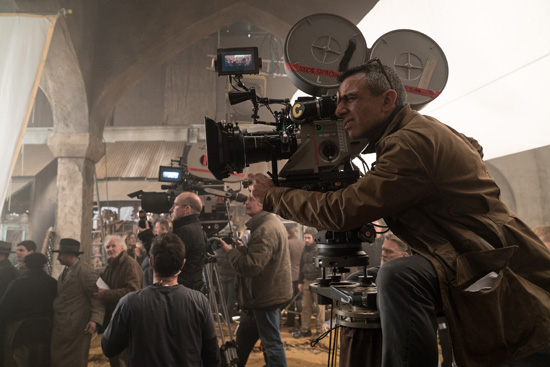 Mark
Gordon - Producer Mark
Gordon - ProducerMark Gordon is an award-winning motion picture and television producer with more than 100 motion picture and television projects to his credit. In addition to ‘Murder on the Orient Express’, Gordon’s films include upcoming projects ‘The Nutcracker and the Four Realms’ with Lasse Hallström directing, and starring Keira Knightley, Morgan Freeman, Mackenzie Foy, and Misty Copeland; and ‘Molly’s Game’ starring Jessica Chastain and Idris Elba, with Aaron Sorkin writing and directing. Past film credits include ‘Saving Private Ryan’ (which earned Gordon Academy Award and BAFTA nominations, as well as a Golden Globe for Best Picture), ‘Steve Jobs’, ‘2012’, ‘The Day After Tomorrow’, ‘Speed’, ‘Source Code’, ‘The Messenger’, and ‘The Patriot’, among others. As an executive producer and financier, Gordon’s credits include ‘Tomb Raider’, ‘Wonder Boys’, ‘The Painted Veil’, ‘A Simple Plan’ and ‘Primary Colors’. In the television arena, Gordon currently serves as an executive producer on ‘Ray Donovan’, ‘Grey’s Anatomy’, ‘Criminal Minds’, and ‘Quantico’. The Mark Gordon Company also serves as co-studio with ABC Studios on ‘Designated Survivor’ starring Kiefer Sutherland, currently in its second season on ABC. In 2015, Gordon was honored by the Producers Guild of America with the Norman Lear Award for achievement in television. Gordon is a five-time Emmy nominee and two-time winner. Additionally, he won a Golden Globe for his work on ‘Grey’s Anatomy’. Some of his other television credits include the Emmy Award-winning ‘Warm Springs’, ‘Private Practice’, ‘Army Wives’ and ‘Reaper’. In 2015, The Mark Gordon Company partnered with Entertainment One (eOne) to create an independent television and film studio. Gordon serves as CEO for the company, which both finances and produces premium content by Mark as well as other producers. Gordon is the President Emeritus of the Producers Guild of America, having served as its President from 2010 through 2014, where he spearheaded the establishment of The Producer’s Mark. A devoted philanthropist and champion of public education, Gordon is the founder of Citizens of the World Charter Schools (CWC), which serves more than 1,400 students across six schools in Los Angeles, Brooklyn, and Kansas City. Gordon currently serves on the board of the Fulfillment Fund and is the former chairman of Teach for America Los Angeles. He is also a former board member of the Virginia Film Festival, Chrysalis, the Motion Picture and Television Fund, and UCLA Lab School. Judy Hofflund - Producer Primarily a talent agent and manager, Hofflund started as the first woman in the mailroom at CAA. She then formed the successful boutique agency Intertalent which later merged with UTA. Subsequently, she started her own management company. As a manager, she represented Branagh for twenty years and also had long representation relationships with Julia Louis-Dreyfus, Kevin Kline, Sally Field and Alan Rickman, among others. Together with Gavin Polone, she produced 'Panic Room' at Columbia Pictures and 'Drop Dead Gorgeous' for New Line Cinema. She also produced Branagh's 'As You Like It' for HBO. 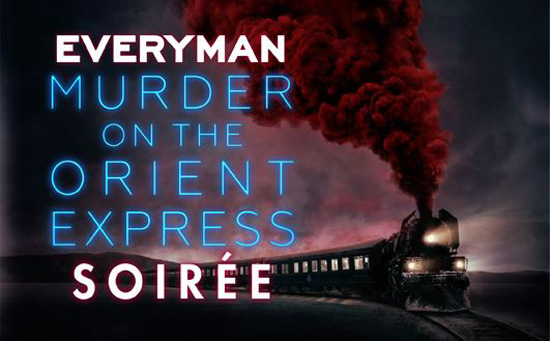 Ridley Scott - Producer Ridley Scott - ProducerRidley Scott is a renowned Academy Award®-nominated filmmaker honored with Best Director Oscar® nominations for his work on 'Black Hawk Down' (2001), 'Gladiator' (2000) and 'Thelma & Louise' (1991). All three films also earned him DGA Award nominations. Scott’s most recent release is the critically acclaimed box office phenomenon 'The Martian' starring Matt Damon and Jessica Chastain. 'The Martian' received numerous awards and nominations, including, Golden Globes® for Best Motion Picture Musical or Comedy and Best Actor in a Musical or Comedy, 7 Academy Award® nominations, including Best Picture, a DGA Award nomination, and 6 BAFTA nominations, including Best Director. Scott is currently in post-production on 'Alien: Covenant', the sequel to 'Prometheus', starring Michael Fassbender and Katherine Waterston. He will next helm 'Wraiths of the Broken Land' for 20th Century Fox. Scott has garnered multiple nominations over his illustrious career. In addition to his Academy Award® and DGA nominations, he also earned a Golden Globe® nomination for Best Director for 'American Gangster', starring Denzel Washington and Russell Crowe. As he also served as a producer on the true-life drama, Scott shared in a BAFTA nomination for Best Film. Scott also received Golden Globe® and BAFTA nominations for Best Director for his epic 'Gladiator'. The film won the Oscar®, Golden Globe® and BAFTA Award for Best Picture. In 1977 Scott made his feature-film directorial debut with 'The Duellists', for which he won the Best First Film Award at the Cannes Film Festival. He followed with the blockbuster science-fiction thriller 'Alien', which catapulted Sigourney Weaver to stardom and launched a successful franchise. In 1982 Scott directed the landmark film 'Blade Runner', starring Harrison Ford. Considered a sci-fi classic, the futuristic thriller was added to the U.S. Library of Congress’ National Film Registry in 1993 and a director’s cut was released to renewed acclaim in 1993 and again in 2007. Additional film credits as director include 'Exodus: Gods and Kings' starring Christian Bale and Joel Edgerton; 'The Counselor', written by Cormac McCarthy and starring Michael Fassbender, Brad Pitt, Cameron Diaz and Javier Bardem; the acclaimed hit 'Prometheus', starring Michael Fassbender, Noomi Rapace and Charlize Theron; 'Legend', starring Tom Cruise; 'Someone to Watch Over Me', starring Tom Berenger; 'Black Rain', starring Michael Douglas and Andy Garcia; '1492: Conquest of Paradise', starring Gérard Depardieu; 'White Squall', starring Jeff Bridges; 'G.I. Jane', starring Demi Moore and Viggo Mortensen; 'Hannibal', starring Anthony Hopkins and Julianne Moore; 'Body of Lies', starring Russell Crowe and Leonardo DiCaprio; 'A Good Year', starring Russell Crowe and Albert Finney; the epic 'Kingdom of Heaven', with Orlando Bloom and Jeremy Irons; 'Matchstick Men', starring Nicolas Cage and Sam Rockwell; and 'Robin Hood', marking his fifth collaboration with star Russell Crowe, also starring Cate Blanchett. Scott and his late brother Tony formed the commercial and advertising production company RSA in 1967. RSA has an established reputation for creating innovative and groundbreaking commercials for some of the world’s most recognized corporate brands. In 1995 the Scott brothers formed the film and television production company Scott Free. With offices in Los Angeles and London, the Scotts produced such films as 'In Her Shoes', 'The A-Team', 'Cyrus', 'The Grey' and the Academy Award®-nominated drama 'The Assassination of Jesse James by the Coward Robert Ford'. On television, Scott executive produced the Emmy®, Peabody and Golden Globe®-winning hit 'The Good Wife', for CBS and the critically-acclaimed series adaptation of Philip K. Dick’s classic 'The Man in the High Castle' for Amazon. Scott has also been an executive producer on the company’s long-form projects, including the Starz miniseries 'The Pillars of the Earth', the A&E miniseries 'The Andromeda Strain', the TNT miniseries 'The Company', the award-winning HBO movies 'RKO 281', 'The Gathering Storm' and 'Into the Storm' and the hit National Geographic Channels’ telefilms 'Killing Lincoln', 'Killing Kennedy' and 'Killing Jesus'. In 2003 Scott was awarded a knighthood from the Order of the British Empire, in recognition of his contributions to the arts. He received the 30th American Cinematheque Award at the organization’s annual gala in 2016. Simon Kinberg - Producer Simon Kinberg has established himself as one of Hollywood’s most prolific filmmakers, having written and produced projects for some of the most successful franchises in the modern era. His films have earned more than five billion dollars worldwide. Kinberg graduated from Brown University, and received his MFA from Columbia University Film School, where his thesis project was the original script, 'Mr and Mrs Smith'. The film was released in 2005, starring Brad Pitt and Angelina Jolie. In 2006, he wrote 'X-Men: The Last Stand', which opened on Memorial Day to box office records, and began his ongoing relationship with the franchise. In 2008, Kinberg wrote and produced Doug Liman’s film 'Jumper' for 20th Century Fox. In 2009, Kinberg co-wrote the film 'Sherlock Holmes' starring Robert Downey Jr, directed by Guy Ritchie. The film received a Golden Globe for Best Actor, and was nominated for two Academy Awards. In 2010, Kinberg established his production company Genre Films, with a first look deal at 20th Century Fox. Under this banner, he produced 'X-Men: First Class', executive produced 'Abraham Lincoln: Vampire Hunter', and wrote and produced 'This Means War'. In 2013, Kinberg produced 'Elysium', which starred Matt Damon and Jodie Foster, directed by Neill Blomkamp. On Memorial Day of 2014, Fox released 'X-Men: Days of Future Past', which Kinberg wrote and produced. The film opened number one at the box office, received critical acclaim, and went on to gross more than 740 million dollars worldwide. In 2015, Kinberg had four films in release. He re-teamed with Neill Blomkamp to produce 'Chappie', starring Hugh Jackman and Sharlto Copley. Kinberg produced Disney’s Academy Award nominated 'Cinderella', starring Cate Blanchett and directed by Kenneth Branagh. In addition, Kinberg was the co-writer and producer of 'The Fantastic Four'. His final film of the year was 'The Martian', which he produced. The film, directed by Ridley Scott and starring Matt Damon, grossed more than 630 million dollars worldwide, won two Golden Globes (including Best Picture), and was nominated for seven Academy Awards (including Best Picture for Kinberg). In 2016, Kinberg produced 'Deadpool', starring Ryan Reynolds. The film was released in February, and broke international and domestic records for box office, including being the highest-grossing R-rated film of all time globally. It has gone on to win two Critics Choice Awards (including Best Picture - Comedy), and receive two Golden Globe nominations (including Best Picture), a WGA nomination, and a PGA nomination for Best Picture. The most recent release for Kinberg was 'X-Men: Apocalypse' on Memorial Day 2016, which he wrote and produced. The film was Kinberg’s twelfth film to open number one at the box office. This year, he is the producer of 'Logan', the final installment of the Wolverine franchise with Hugh Jackman. It was selected as the closing film of the Berlin Film Festival. Kinberg is also attached to produce the X-Men spinoff movies 'Gambit' starring Channing Tatum, 'Deadpool2' starring Ryan Reynolds, and 'New Mutants', directed by Josh Boone. He is also writing and producing the next X-Men movie. On the television side, Kinberg is the executive producer of 'Designated Survivor', starring Kiefer Sutherland, on ABC. And he is the executive producer of 'Legion', a Marvel TV/FX Network production. Kinberg is also writing and producing one of the upcoming 'Star Wars' films. He served as consultant on 'Star Wars: Episode VII' and 'Rogue One', and he is the creator and executive producer of the animated show 'Star Wars: Rebels' on Disney networks. Aditya Sood - Producer Aditya Sood is the President of Simon Kinberg's production company, Genre Films. Sood was a producer of the Golden Globe-winning and Oscar nominated film 'The Martian' (2015) and an executive producer of 'Deadpool' (2016). He is an executive producer on the ABC political thriller 'Designated Survivor', starring Kiefer Sutherland. Genre Films has a first look deal at 20th Century Fox. Prior to working at Genre, Sood ran Walter Parkes and Laurie MacDonald's production company at DreamWorks and was vice president of production at Warner Bros. Pictures. He started his career at New Line Cinema and DreamWorks, and later as a story editor for producer Mark Johnson. Michael Green - Writer Michael Green is a television and film writer and producer who has received numerous accolades for his work, including an Emmy nomination for Outstanding Drama Series in 2007 for 'Heroes'. His current feature projects include the upcoming 'Blade Runner 2049', directed by Denis Villeneuve; 'Alien: Covenant', directed by Ridley Scott; and 'Logan', directed by James Mangold. In television, Green currently serves as executive producer and co-showrunner of Starz’s 'American Gods', adapted from Neil Gaiman’s award-winning novel by Green and Bryan Fuller. Green also created and executive-produced NBC’s 'Kings' and ABC’s 'The River'. He has additionally written and produced for numerous shows including 'Heroes', 'Everwood', 'Smallville', 'Jack & Bobby' and 'Sex and the City'. Jim Clay - Production Designer Born in England’s North Yorkshire, Clay originally studied Architecture before joining the BBC Television Art Department in the 1970s. As a Production Designer, Clay passionately believes in the quality of design and sees his role as helping to create the psychological climate for a director’s narrative. This principle is evident throughout a diverse body of work that ranges from the fanciful design of the BBC classic 'The Singing Detective' – which earned him his first BAFTA nomination, to the starkly realistic dystopian world of Alfonso Cuaròn’s 'Children of Men', which garnered a nomination from the Art Directors Guild and earned him a BAFTA award. His recent work includes Simon Curtis' 'Woman in Gold', 'Red 2' for director Dean Parisot, and John Crowley’s 'Closed Circuit'. Some of Clay’s further credits include such exemplary films as Woody Allen’s 'Matchpoint' and 'You Will Meet a Tall Dark Stranger', Richard Curtis’ 'Love Actually', Chris and Paul Weitz’s 'About a Boy', Atom Egoyan’s 'Felicia’s Journey', Neil Jordan’s 'The Crying Game', John Madden’s 'The Debt', and 'Great Expectations' with director Mike Newell. 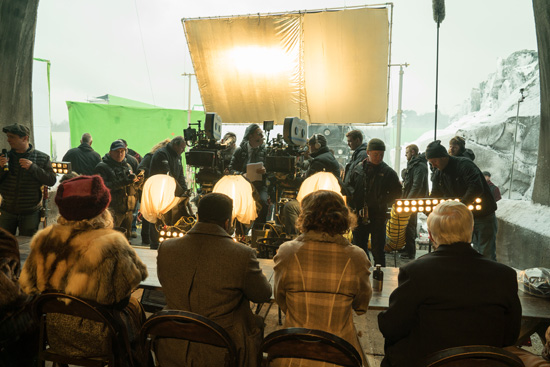 Alexandra
Byrne - Costume Designer Alexandra
Byrne - Costume DesignerCostume Designer Alexandra Byrne trained as an architect at Bristol University before studying Theatre Design on the Motley Course at the English National Opera under the legendary Margaret Harris. She has worked extensively in television and theatre, both as a set and costume designer. Her television credits include Roger Michell’s 'Persuasion', for which she received the BAFTA Award for Best Costume Design, and 'The Buddha of Suburbia', for which she received a BAFTA nomination and RTS award. In theatre, Byrne received a Tony nomination for Best Set Design for 'Some Americans Abroad', which transferred from the Royal Shakespeare Company to the Lincoln Center in New York. Following on from her work in theatre, Byrne designed the costumes for Kenneth Branagh’s 'Hamlet', for which she gained her first Oscar nomination. Other credits include 'Phantom of the Opera', 'Sleuth', also with Branagh and 'The Garden of Eden'. She received two further Oscar nominations for her costumes in 'Elizabeth' and 'Finding Neverland'. 'Elizabeth, The Golden Age' finally won her the Oscar. Byrne worked with Kenneth Branagh again on 'Thor', her first production with Marvel, and won the Saturn Award. She then followed on to work with Joss Whedon on 'Marvel’s The Avengers'. After designing costumes for Warner’s '300, Rise of an Empire', Byrne returned to Marvel for James Gunn's 'Guardians of the Galaxy', and to work again with Joss Whedon on 'Avengers, Age of Ultron' (Saturn Award), followed by 'Doctor Strange', directed by Scott Derrickson. Byrne is married to the actor Simon Shepherd, and they have four children. |
|
| Go: back - top - back issues - news index Updated 22-01-25 |
